Thunder Bay, Ontario is one of the many Canadian cities that you can explore if you’re moving to Canada. It’s smart to research different Canadian cities before you arrive so that you can select the city that best meets your personal and professional needs. Choosing the right location is also important because it will play a vital role in your financial success.
Your careful research will help you to select the best landing location for you and your family. You can start by assessing the local job market, housing options, and community to determine if it is right for you. If you’re considering living in Thunder Bay, Ontario, Prepare for Canada can guide you with this helpful information.
About Thunder Bay, Ontario
Thunder Bay is the capital of Northwestern Ontario and offers a relaxing, natural atmosphere with lively urban space to live, learn, work, do business and play. Located on the north shore of Lake Superior, it is often referred to as the “Lakehead” because it’s the head of the Great Lakes. It’s the most populous municipality in Northwestern Ontario.
The city has roots dating back to 1683 when it was settled as Fort Caministigoyan. And today, the city comprises two former cities, Port Arthur, and Fort William which both still retain much of their distinct identities. These cities joined to become the City of Thunder Bay in 1970.
How Many People Live in Thunder Bay, Ontario?
There is a population of 108, 843 based on the 2021 Census. If you include the surrounding communities, such as Oliver Paipoonge, Neebing, Shuniah, Conmee, O’Connor, and Gillies, and the Fort William First Nation, there are over 125, 000 people in the region.
How to Find a Job & Build a Career in Thunder Bay
The Local Economy
As the largest city in Northwestern Ontario, this city is a vibrant and growing community and is the region’s commercial, administrative, and medical hub. From trees to transportation to research, health and life sciences, Thunder Bay has been developing its knowledge-based industries, primarily in the fields of biotechnology and molecular medicine.
The city is home to the western campus of the Northern Ontario School of Medicine, the first medical school to open in Canada in a generation.
The top industries in this city are:
- Education
- Transportation
- Manufacturing
- Mining
- Forestry.
Major Employers in Thunder Bay
Here are the top employers in the city:
- Thunder Bay Regional Health Sciences Centre
- Lakehead District School Board
- The City of Thunder Bay
- Bombardier Transportation
- Lakehead University
- Barrick Hemlo Gold Mine
- Resolute Forest Products
- Canadian Pacific Railway.
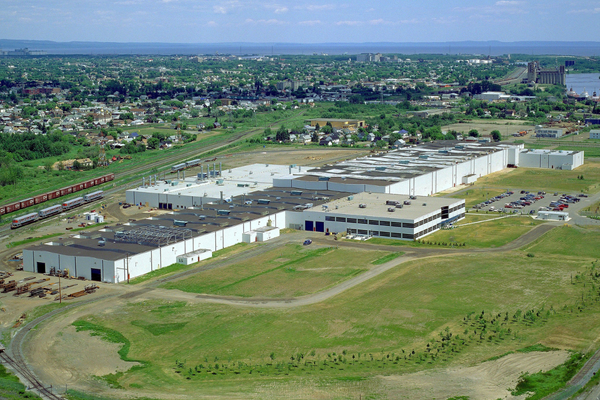
Career Pathways in Thunder Bay
There are many ways you can look for jobs in the city. You can use the Government of Canada Job Bank and other websites. You can also use local recruitment agencies such as YES Employment Services, Workforce, and The Phelps Group Inc.
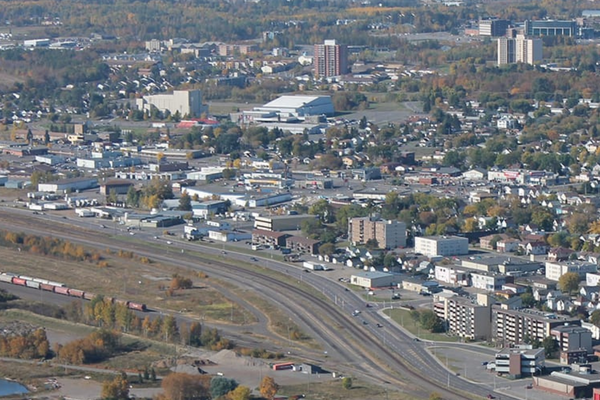
The Thunder Bay Housing Market
Where you live within a city is important. You’ll want to be close to your job, schools, and other amenities. Even though it is a smaller city, there are still many neighbourhoods and communities to consider such as Port Arthur and Fort William. Other areas to consider are the Bay, Algoma, Simpson-Ogden, and Westfort.
Is Housing Expensive in Thunder Bay, Ontario?
Affordability is an attractive feature of living in the city. Thunder Bay was ranked number 1 out of 227 major urban international cities for affordable housing, by the fourth annual Demographia International Housing Affordability Survey in 2021.
Finding a Place to Rent in Thunder Bay
Even though you may not have as many options as other larger cities, you have more affordable rental options. The average rent for an apartment is $1,150 for a Bachelor, $1,250 for a 1 Bedroom, $1,350 for a 2 Bedroom, and $1,349 for a 3 Bedroom.
Use Rentals for Newcomers to search for available rental units in Thunder Bay. You can also find current rental prices in Thunder Bay. When renting, it’s also important to consider buying  . While renters’ insurance is optional, many property owners may require you to get a policy.
. While renters’ insurance is optional, many property owners may require you to get a policy.
Get more information about renting a home: Renting in Canada: What Newcomers Need to Know

Buying a Home in Thunder Bay
Buying a home in the city is more affordable than cities like Toronto and even other Ontario cities like Barrie.
According to the Thunder Bay Real Estate Board, the median sale price for single-detached homes is $366,900 (as of March 2022). Even though prices are on the rise, they are still well below the Canadian average. Find out more about buying your first home in Canada: First Time Home Buyer: Newcomer Tips.
Driving & Public Transit in Thunder Bay
Driving in Thunder Bay, Ontario
There are a lot of rural roads in Thunder Bay. Driving can be challenging at times, especially during the winter months. With significant wildlife in the region, it’s essential to always pay attention. The main highway through the city is Highway 11/17, also known as the Thunder Bay Expressway.
All drivers must have a valid Ontario driver’s licence.
Get more information about driving in Canada:
Getting Your Ontario Drivers License
Driving Test in Canada: A Full Guide
Tips for Winter Driving to Ensure Your Safety
Thunder Bay Public Transit
Thunder Bay Transit operates 17 bus routes across the city. For maps, routes, and schedules, click here. The cost of public transit varies depending on the route, method, and distance. See here for a list of fare prices.
The city is home to the Thunder Bay International Airport and it’s a railway hub for Canadian National and Canadian Pacific Railway.
Community Support for Newcomers
New immigrants have access to community support through several organizations. They are Thunder Bay Multicultural Association (TBMA), Doors to New Life, and 211 Ontario North.
Language Support in Thunder Bay
Language support services are offered through TBMA, Lakehead University and Confederation College.
Personal Finance & Banking
Establishing your finances in a new country is an essential step. Newcomers can open a bank account, apply for credit cards and loans, and get a mortgage through local banks and credit unions. They have programs in place to assist new immigrants.
Get more banking tips for newcomers:
Top 10 Financial Steps to Take Before You Leave for Canada
Move to Canada | Transferring Cash & Valuables
Open a Bank Account Before Arriving in Canada
Thunder Bay’s Education System
There are many primary and secondary education schools. Thunder Bay has 38 elementary schools, three middle schools, eight secondary schools, two private schools, a university, a college, a medical school, and an adult education facility. These schools include French immersion programs, comprehensive special education services, an International Baccalaureate Programme, and an Outdoor Education Centre.
Elementary and High School Education
The main school boards serving the area are the Lakehead District School Board, the Thunder Bay Catholic District School Board, and the Conseil scolaire de district Catholique des Aurores boréales (CSDC).
The Lakehead District School Board is the largest, with 22 elementary schools, four secondary schools and a centre for adult studies. The Thunder Bay Catholic District School Board has 16 elementary schools, three middle schools and two high schools. CSDC operates one elementary and one high school in Thunder Bay, and six schools throughout the Thunder Bay District.
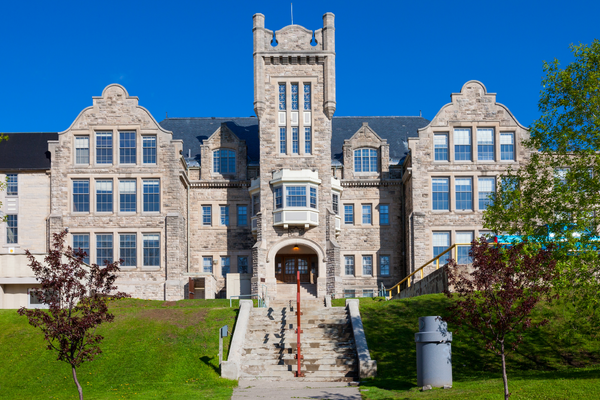
Post Secondary Institutions
This city is home to Lakehead University and Confederation College. The Northern Ontario School of Medicine has a campus at Lakehead University. Lakehead has about 8,000 students and Confederation College has about 35,00 full-time students. Both offer satellite campuses across Northern Ontario.
Read more about education in Canada:
Schooling in Canada | A Look at the Education System
Higher Education Offers Benefits to Newcomers
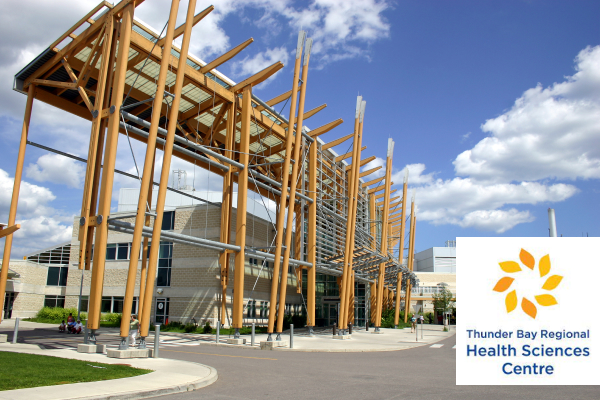
Where to Get Medical Care in Thunder Bay, Ontario
The city is home to the Thunder Bay Regional Health Sciences Centre, and many long-term care centres operated by the St. Joseph’s Care Group such as the Lakehead Psychiatric Hospital, St. Joseph’s Hospital, and Hogarth Riverview Manor. And, there are smaller medical and dental clinics.
The Ontario Health Insurance Plan (OHIP) provides residents with health care coverage. Learn how to apply for an OHIP card. In case of an emergency call 9-1-1. This number is the same no matter where you live in Canada. For prescription drugs and services that Ontario Health does not cover, you can pay for additional  .
.
How to Find a Family Doctor in Thunder Bay
You can look for a family doctor who is taking on new patients through Health Care Connect. Or call 1-800-445-1822 or visit www.ontario.ca/findadoctor to search online.
What is Day-to-Day Life Like in Thunder Bay?
Things to Do in Thunder Bay
This city is a great place to live if you enjoy the outdoors. It’s home to many parks, conservation areas, and trails. It’s a family-friendly city with many recreation facilities and neighbourhood community centres that offer fitness and seasonal activities.
The city operates indoor ice rinks and seasonal outdoor rinks, indoor and seasonal outdoor community pools, several curling sheets, golf courses, and more. And residents enjoy active lifestyles because they are close to the Boreal Forest wilderness and the rolling hills and mountains of the Canadian Shield.
Public Spaces & Attractions
The city’s main attraction is Fort William Historical Park. Other top places to visit include The Waterfront District marina in Port Arthur, Terry Fox Memorial and Lookout, and Thunder Bay Art Gallery.
Restaurants & Nightlife
The best places to eat, dance, and enjoy nightlife are close to Marina Park. Some of the best places to check out include The Sovereign Room, The Foundry, and On Deck.

Nature & Natural Landscapes
The natural landscapes and parks are what sets Thunder Bay apart. You can hike in Sleeping Giant Provincial Park, climb Mount McKay, check out the Kakabeka Falls, and explore Ouimet Canyon Provincial Park and Eagle Canyon. Plus, there are many other parks, trails, and ski areas to explore.
Sporting Events & Concerts
This city does not have any professional sports teams. But, they do have minor sports teams in addition to the Lakehead Thunderwolves who compete in Ontario University Athletics (OUA). If you are looking to enjoy a concert, check out the Thunder Bay Community Auditorium, and NV Music Hall.
Culture & Diversity in Thunder Bay
Diversity
Thunder Bay is also the sixth most culturally diverse community of its size in North America, with Finnish, Italian, Scottish, Ukrainian, Polish, French, Chinese and Croatian ethnicities. About 4% of the population are visible minorities.
There are close to 14,000 people of Finnish descent, making the city the largest Finnish community in Canada. As well, the city also has a large Indigenous population that represents 13.2% of the population.
Worship
The city is home to Christian Churches of all denominations, as well as Jewish, Hindu, Muslim, Buddhist, and Sikh, among others. About 80% of residents identify as Christian.
You can connect with local multicultural associations to find information about specific faith communities, places of worship and ethnocultural organizations in the city.
The Weather in Thunder Bay
This is the sunniest city in eastern Canada with an average of 2,167 hours of sunshine each year. The sun may be out even in winter and snow. And while summer gets warm, it is cool in the evening, which makes it less humid and more comfortable than other Ontario cities. The average daily temperature is -14.8 °C (average high of -8.6 °C) in January and 17.6 °C (average high of 24.2°C) in July.
With plenty of snow and large vertical drops, local ski hills are great for downhill skiing and snowboarding. Loch Lomond Ski Area is the city’s largest ski area.
Common Questions Immigrants Ask About Living in Thunder Bay
Is Thunder Bay a Good City for Immigrants?
As part of the Rural and Northern Immigration Pilot, the city is looking to attract new immigrants. This will create job opportunities for newcomers. The city is looking for skilled foreign workers to fill job vacancies. And, this makes it a city worth considering for new immigrants.
What are Some Potential Disadvantages of Living in Thunder Bay for New Immigrants?
While the immigrant population is small, the city is working to attract more newcomers. Another downside is it lacks big-city attractions and is more remote. However, you will discover an outdoor haven and an escape from congested cities.

What are the Benefits of Living in Thunder Bay?
Thunder Bay is a beautiful part of Canada. It has unique natural attractions and it’s an ideal location for people who enjoy the outdoors. The city has several growing job sectors, offering many career options. Housing affordability is one of the most attractive benefits.
Choosing a city is one of the biggest decisions you’ll make when moving to Canada. While many immigrants consider landing in large cities such as Toronto, smaller cities like Oshawa, Ontario can offer what you’re looking for. This city provides safe neighbourhoods, good schools, and a variety of businesses. It’s also proud of its growing retail and business segment while showing a commitment to community-based living.
Selecting the right city, for example, one that is affordable, offers suitable career options, and meets the needs of you and your family takes some research. It’s vital to consider the location, local economy, transit system, education, and overall quality of living within a city to ensure it meets your selection criteria. This upfront effort can help you avoid landing in a city, only to find it necessary to move to a more suitable city. And, moving again can be expensive. So, let Prepare for Canada guide you with helpful information about living in Oshawa, Ontario.
About Oshawa, Ontario
The Greater Toronto Area (GTA) consists of a number of regional municipalities, including Durham Region. This region forms the east end of the GTA, along Lake Ontario and Oshawa is the largest city in the region. The city is located about 60 km east of Toronto.
Because Oshawa is home to the General Motors headquarters in Canada, it is known as “Canada’s Motor City”. It’s a safe and family-friendly area ideal for commuters.
Oshawa was incorporated as a village in 1850 and has grown into the city it has become today. The name Oshawa originates from the Ojibwa term aazhawe, meaning “the crossing place.”
How Many People Live in Oshawa, Ontario?
The city of Oshawa is a mid-sized city with a population of over 170,000 residents. The population in the metro area (which includes Whitby and Clarington) is over 405,000. The population is growing consistently at 1% per year. This makes the Oshawa area the sixth largest in Ontario.
How to Find a Job & Build a Career in Oshawa
Oshawa’s Local Economy
Oshawa is known for its strategic location along the eastern part of the Greater Toronto area. Highway 401 links the city with Toronto, Montreal, and Ottawa. Manufacturing and construction are two major growth industries. Manufacturing is expected to grow by 8.5% in 2022 and construction by 4.3%. The city will also see the reopening of GM Canada’s Truck Assembly Plant, which will boost the local economy.
Here is a breakdown of the biggest industries in the city:
- Healthcare 18%
- Retail Trade 15%
- Educational Services 11%
- Admin & Support 8%
- Public Administration 8%
- Accommodations & Food Services 8%
- Manufacturing 6%
- Professional Services 3%
- Finance & Insurance 3%
- Information & Cultural 2%
- Other 18%.
Major Employers in Oshawa
There are close to 12,000 companies, employing about 70,000 residents. Employment grew by about 5.9% in 2021. The top employers include:
- General Motors of Canada
- Ontario Ministry of Finance
- University of Ontario Institute of Technology
- Lakeridge Health
- Concentrix.
Career Pathways in Oshawa
There are several ways to search for job opportunities. You can use the Government of Canada Job Bank, search individual websites of the top employers in Oshawa and use an employment agency. The top recruitment agencies in the area are Durham Recruiting, Adecco, Redwood Employment, and Randstad Canada.
The Oshawa Housing Market
Finding a place to live is at the top of the priority list for newcomers. Whether you plan to rent or buy, assessing your housing options is important. Knowing where top employers, schools, stores, and other amenities are located can help you make your decision.
Is Housing Expensive in Oshawa, Ontario?
Affordability is increasingly becoming an issue in Oshawa as many people in the City of Toronto move out of the city. Oshawa is now one of the most expensive places to rent an apartment in the GTA. Real estate prices have also risen in recent years.
Finding a Place to Rent in Oshawa
If you are looking to rent, there are many neighbourhoods to consider such as Vanier, Donevan, Eastdale, O’Neil, and Central Oshawa. You could also consider nearby towns such as Whitby, Ajax, and Bowmanville. While prices can vary based on factors such as location, size, and apartment features, the average rent in Oshawa is $1,349 for a Bachelor, $1,26 for a 1 Bedroom, $2.143 for a 2 Bedroom, and $2,264 for a 3 Bedroom.
Rentals for Newcomers site is a practical and easy-to-navigate website to search for housing! You can even determine the average cost of rentals in each city. This is helpful since rental prices change often.
Once you find a place to rent, make sure to protect it with  in Canada, property owners may request proof of insurance as part of the rental agreement. Your landlord’s insurance policy will not cover you.
in Canada, property owners may request proof of insurance as part of the rental agreement. Your landlord’s insurance policy will not cover you.
Get more information about renting a home: Renting in Canada: What Newcomers Need to Know

Buying a Home in Oshawa
The average price to buy a home in Oshawa is $793,000 according to Zolo. The average cost of a detached 3-bedroom home is $790,000. A 3-bedroom townhouse is $694,000, and the average price for a condo is $524,000 (figures as of September 2022).
While many newcomers arrive in Canada with savings to purchase their first home, this is one of the largest investments you’ll likely make in Canada. So, it’s vital to inform yourself about the process and key factors to consider. To learn more about buying your first home in Canada, check out: First Time Home Buyer: Newcomer Tips.
Driving & Public Transit in Oshawa
Driving in Oshawa, Ontario
Like many other cities in the Greater Toronto Area, Oshawa is a commuter town. This means that many people live in Oshawa and drive to offices across the Durham region or downtown Toronto. Highway 401 goes directly through the city and connects to other Highways such as Highway 412, Highway 418, and Highway 407 ETR.
All drivers must have a valid Ontario driver’s licence and insurance. The province of Ontario has a graduated licencing system. You must complete all steps to become a fully licensed driver. Learn more about driving in Canada:
Driving in Canada: 10 Essential Facts to Know
Driving Test in Canada: A Full Guide
Tips for Winter Driving to Ensure Your Safety

Oshawa Public Transit
Oshawa has a good public transit system. Go Transit trains and busses connect residents to Toronto. Durham Regional Transit offices local bus services in the city. The transit system makes it easier and more affordable to commute to work. In addition, it offers a greener way to travel and avoids the frustration of dealing with heavy traffic congestion.
The city is also home to the Port of Oshawa and Oshawa Executive Airport.
Community Support for Newcomers
All newcomers to Oshawa can get settlement assistance through Welcome Centre Immigrant Services. They can help you with many settlement services such as finding housing, searching for jobs, accessing health care, and they can answer your questions about getting settling in Oshawa. Read more about settlement services and how they can help you succeed.
Language Support in Oshawa
Language skills are vital to your success in Canada. The Welcome Centre Immigration Services offers language support where you can get your language skills assessed, get reading and writing help, and receive community services in your mother tongue. You can also find language courses through Durham College and other post-secondary institutions in the city.
Personal Finance & Banking
A good financial plan will help newcomers acclimate to the city more effectively. Once you arrive in Oshawa you can open a bank account with a local bank or credit union. Both offer services and financial products for new immigrants. They can help you open accounts, get a credit card, apply for a mortgage, and even get a line of credit. Visit a local branch or open an account online.
Get more banking tips for newcomers:
How Much Money Will I Need to Move to Canada?
Top 10 Financial Steps to Take Before You Leave for Canada
Move to Canada | Transferring Cash & Valuables
Oshawa’s Education System
The government of Ontario oversees the school system in the province. However, each city has a unique school board that runs the day-to-day operations of the primary, high school, and post-secondary schools.
Elementary and High School Education
Public education is offered through the Durham District School Board. There are 28 elementary and 6 high schools in the city. The Durham Catholic District School Board oversees catholic education. There are 11 Catholic elementary and 2 high schools. There are also several French language and private schools.
Post Secondary Institutions
There are three post-secondary schools in Oshawa with over 20,000 full-time students. They include:
- Durham College
- University of Ontario Institute of Technology (UOIT)
- Trent University Durham
Read more about education in Canada:
Schooling in Canada | A Look at the Education System
Higher Education Offers Benefits to Newcomers
Where To Get Medical Care in Oshawa, Ontario
Oshawa residents have access to great healthcare. Lakeridge Health Oshawa is one of the largest community hospitals in the province. RS. McLaughlin Durham Regional Cancer Centre is also onsite. In case of an emergency call 9-1-1. This number is the same no matter where you live in Canada.
The Ontario Health Insurance Plan (OHIP) provides residents with health care coverage. You must be a resident to qualify. Learn how to apply for an OHIP card.
You also have the option to buy additional  to help cover the costs of prescription drugs and services that are not covered by OHIP. Many employers also offer healthcare benefits as part of your employee benefits package.
to help cover the costs of prescription drugs and services that are not covered by OHIP. Many employers also offer healthcare benefits as part of your employee benefits package.
How to Find A Family Doctor In Oshawa
Having a family doctor is important to ensure you can access healthcare. You can search for a family doctor taking new patients through Health Care Connect. You can call 1-800-445-1822 or visit www.ontario.ca/findadoctor to search online.
If you cannot find a family doctor in Oshawa, you may be able to find one from another nearby town. You can also visit a local walk-in clinic to receive no emergency care.
Get more information about health care in Canada: Steps to Access Free Health Care in Canada.
What is Day-to-Day Life Like in Oshawa?
Things to Do in Oshawa
Oshawa’s proximity to Lake Ontario and spacious parkland provide residents with lots to explore. The city is only a short drive from Toronto, which offers access to many entertainment options.
Public Spaces & Attractions
There are a variety of public attractions for residents to enjoy. Some of the top tourist attractions include Canadian Automotive Museum, Ontario Regiment RCAC Museum, The Robert McLaughlin Gallery, Tribute Communities Centre, Oshawa Museum, and Parkwood Estate.
Restaurants & Nightlife
The city offers a diverse selection of cuisine options, including Wildfire Steakhouse, Cyrus Persian Restaurant, Avanti, The White Apron Restaurant, and Rainbow Restaurant. The city hosts several festivals throughout the year including Oshawa Peony Festival, Kars on King, and Oshawa Fiesta Week.
Nature & Natural Landscapes
Oshawa has lots for people to explore outdoors. There are wildlife reserves, parks and trails, biking paths, and a beach. Be sure to check out the Waterfront Trail, Darlington Provincial Park, Oshawa Valley Botanical Garden, McLaughlin Bay Wildlife Reserve, and the Oshawa Zoo and Fun Farm.

Sporting Events & Concerts
Oshawa is home to the Oshawa Generals of the Ontario Hockey League (OHL). It also has many other junior sporting teams. If you want to enjoy a concert, check out The Music Hall, Stage 44, and Regent Theatre.
Culture & Diversity In Oshawa
Diversity
Oshawa is a diverse community that continues to welcome new immigrants. The city welcomed 4,700 newcomers in 2021 and they plan to continue to be a city that is welcoming of newcomers. About 15% of the city’s population is visible minorities. The top minority groups are black (5.5%), South Asian (3.8%), Chinese (1.4%), and Filipino (1.3%). 2.9% of the population is Aboriginal.
Worship
Oshawa is a predominantly Christian community. About 75% of residents are either Protestant, Roman Catholic, or Christian, 0.9% are Muslim, 0.4% are Hindu, and 0.4% are Sikh.
The Weather in Oshawa
Oshawa has a similar climate to the rest of southern Ontario. It has a humid continental climate with warm summers and cold winters. The average temperature can be as low as an average of -8.5 Celsius in January to as high as an average of 25.1 Celsius in July.

Common Questions Immigrants Ask About Living in Oshawa
Is Oshawa a Good Place for Immigrants?
Oshawa is a good city for new immigrants. It offers affordable housing options, job opportunities, and great education options. It’s ideal for families and young professionals.
What are the Potential Disadvantages of Living in Oshawa for New Immigrants?
Traffic can be an issue, especially during rush hour. And like many other cities in Ontario, the cost of living is rising. But, these are common disadvantages found in many cities across Canada.
What are the Benefits of Living in Oshawa?
Oshawa is a great city to consider if you want to live in the Greater Toronto Area. It’s a short commute to downtown Toronto with good transit, and real estate is more affordable.
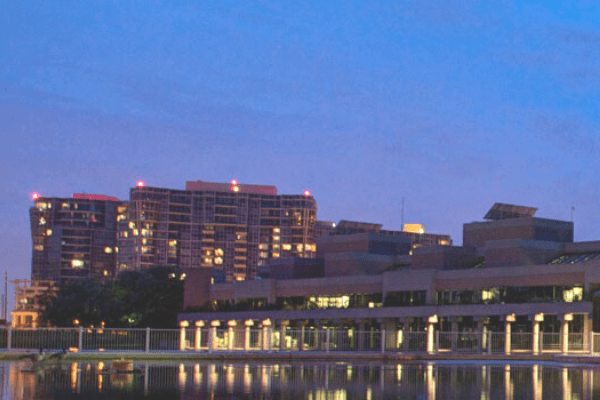
While many new immigrants choose to move to Toronto when they come to Canada, there are many other great cities in the Greater Toronto Area (GTA), including Markham.
The city you choose is a very important decision that will play a big role in your life now and in the future. Before making a final decision, it’s important to consider the local job market, housing costs, transportation and entertainment options. All of these and other factors will shape your lifestyle.
Are you thinking about moving to Markham? Prepare for Canada can guide you with helpful information about living in Markham.
About Markham, Ontario
Markham, Ontario is a diverse city. Similar to other cities in the Greater Toronto Area (GTA), it’s home to people from all over the world. It’s located in York Region about 30 minutes from downtown Toronto. Because of this, it is a popular location for commuters.
The city is home to hundreds of corporate head offices, providing residents with the opportunity to work in many different industries. Importantly, Markham is at the center of the second-largest tech cluster in Canada and a key player in Ontario’s innovation corridor.
As one of the most diverse cities in Canada, diversity and inclusion are a strategic priority for the city. It’s a community that welcomes people from all races and religions.
The city was first settled in 1794 as Thornhill and Unionville. It was later incorporated as a village in 1872, a town in 1971, and a city in 2012.
How Many People Live in Markham, Ontario?
The city of Markham has a population of 338,503, as of the 2021 Census. This is an increase of 2.9% since 2016. It’s the 7th largest city in Ontario and the 4th largest in the Greater Toronto Area.
How to Find a Job & Build a Career in Markham
Markham’s Local Economy
Regarded as Canada’s high-tech capital, the city is home to hundreds of corporate offices and over one thousand high-tech and life science companies. There are more than 10,000 companies in the city, with 240 being foreign, employing more than 179,000 people.
The top industries in Markham are:
- Information and communication technology (ICT)
- Life sciences
- Financial services
- Engineering
- Professional scientific services.
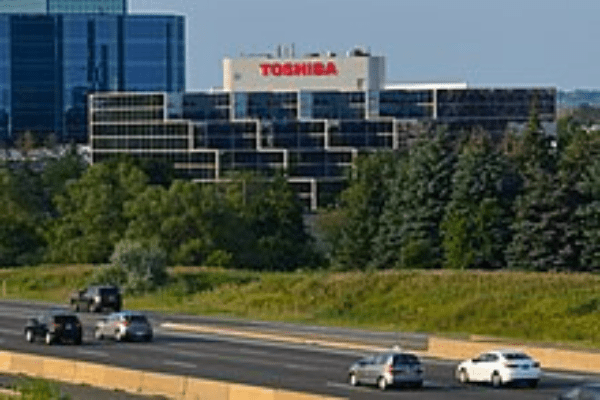
Major Employers in Markham
Markham offers job opportunities with an extensive list of international companies. The city attracts many top high-tech companies in Canada including:
- IBM Canada
- AMD Technologies Inc
- Aviva Canada
- Johnson and Johnson Inc
- TOSHIBA.
Career Pathways in Markham
You can explore opportunities on the Government of Canada Job Bank website, company websites, or by using local recruitment agencies such as Randstad Canada, Robert Half, Aerotek, and Modern Technical Staffing Inc.
The Markham Housing Market
Is Housing Expensive in Markham, Ontario?
Rent and real estate costs are expensive in Markham. It is one of the most expensive cities in Canada. One way to keep costs down is to choose a more affordable neighbourhood or even consider a smaller community close by. Higher living costs are a result of urbanization and the tendency of people to move out of the city of Toronto into suburban areas. This created a greater demand for housing in the region.
Finding a Place to Rent in Markham
Renting an apartment in Markham is significantly more expensive than in other cities in the province. The average cost to rent in Markham is $2025 for a 1 Bedroom, and $3200 for a 2 Bedroom. This is much higher than the provincial average rent of $1,395.
If you are looking to rent, try our Rentals for Newcomers site for a practical and easy-to-use way to find housing! And you can even determine the average cost of rentals in each city. This is helpful since rental prices change often.
When renting a home or apartment, it’s also important to consider buying renter’s insurance. While it’s optional, many landlords require it as part of your tenant application.
Get more information about renting a home: Renting in Canada: What Newcomers Need to Know.

Buying a Home in Markham
Purchasing a home in Markham is expensive. According to Zolo, the average cost of a 3-bedroom home in Markham is $1.4 million (as of May 2022). This is a 14% increase from the previous year. The average price for a 2-bedroom townhouse is $1 million (a year-over-year increase of 40%). The average cost of a condo is $810,000.
Find out more about buying your first home in Canada: First Time Home Buyer: Newcomer Tips
Driving & Public Transit in Markham
Driving in Markham, Ontario
A big part of life for Markham residents involves driving. Many people commute to work in the city and across the GTA. The city has a grid layout with major streets extending to Toronto. They include Yonge Street, Bayview Avenue, and Leslie Street. There are also several major highways passing through the city – Highway 404, Highway 407 ETS toll road, and Regional Road 7 (formerly Highway 7).
All drivers are required to have a valid driver’s licence and insurance to drive in Ontario. Learn more about driving in Canada with these 10 essential facts.
Markham Public Transit
York Region Transit (YRT) connects Markham with other surrounding cities, including Richmond Hill, Newmarket, Vaughan, and Toronto. Residents can travel downtown by connecting to the TTC subway system or GO Transit.
Get more information about driving in Canada:
Driving in Canada: 10 Essential Facts to Know
Getting Your Ontario Drivers License
Driving Test in Canada: A Full Guide
Tips for Winter Driving to Ensure Your Safety
Community Support for Newcomers
Within York Region, newcomers can access five service hub Welcome Centres. They help immigrants to settle and integrate into their new life. There are two centres in Markham, one in the North and another in the South end of the city. These centres offer settlement and employment services in many languages.
Language Support in Markham
Newcomers can receive language support services from the Welcome Centres. You can also find assistance through Settlement.org, and other community groups and educational institutions.
Personal Finance & Banking
Having a strong financial plan is important to be successful. So it’s vital to open a bank account as soon as possible. All local banks and credit unions offer programs for new immigrants to help them open an account and get a credit card. You can also get help qualifying for a mortgage and other financial advice.
Get more banking tips for newcomers:
Top 10 Financial Steps to Take Before You Leave for Canada
Move to Canada | Transferring Cash & Valuables
Open a Bank Account Before Arriving in Canada
Markham’s Education System
Markham has a modern education system with many education options. There are two main school boards in the area. Even though Markham has minimal post-secondary options, you can access top colleges and universities throughout the Greater Toronto Area.
There are many pre-school and daycare options for parents, as well as before and after school programs, and private, public, and community childcare programs across the city.
Elementary and High School Education
The two main school boards in the city are The York Region District School Board and the York Catholic District School Board. The Conseil scolaire Viamonde operates secular French schools. The Conseil scolaire catholique MonAvenir operates Catholic French schools. Overall, there are 190 public schools and over 100 Catholic schools.
Post Secondary Institutions
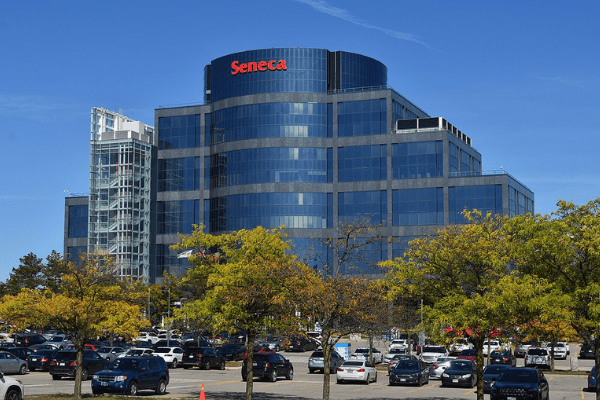
Currently, there are no post-secondary institutions in the city. However, Seneca College has a campus in the business district. York University plans to open a new campus in the city in 2023.
Read more about education in Canada:
Schooling in Canada | A Look at the Education System
Higher Education Offers Benefits to Newcomers
Where To Get Medical Care in Markham, Ontario
The Markham Stouffville Hospital is the city’s main healthcare facility. Residents also have access to care at Shouldice Hospital and at the close by Scarborough Hospital Birchmount Campus. In case of an emergency call 9-1-1. This number is the same no matter where you live in Canada.
The Ontario Health Insurance Plan (OHIP) provides residents with health care coverage. Learn how to apply for an OHIP card. You also have the option to purchase individual health insurance plans.
How to Find A Family Doctor In Markham
Having a family doctor is important to take care of your health. Newcomers can look for a doctor by using Health Care Connect or The College of Physicians and Surgeons of Ontario. Get more information about health care in Canada: Steps to Access Free Health Care in Canada.
What is Day-to-Day Life Like in Markham?
Things to Do in Markham
The city of Markham has a little bit of everything. It’s close enough to Toronto and all the amenities it offers and it has a variety of outdoors and nature to explore. It is close to many of the top attractions in Ontario, in addition to great things to do within the city itself.
Public Spaces & Attractions
Arts culture and diversity are a big part of the community. The city has several performing arts groups including Kindred Spirits Orchestra, Markham Little Theatre, Markham Youth Theatre, Unionville Theatre Company, and the Markham Concert Band.
There are still a variety of small farms in the area. Check out Reesor Farm Market, Galten Farms, Forsythe Family Farms, and Adventure Valley
Other top attractions in the city include Frederick Horsman Varley Art Gallery, Markham Museum, Markham Village, and Cathedral of the Transfiguration. Shopping is big in Markham. There is a large number of Chinese and East-Asian malls and shops.
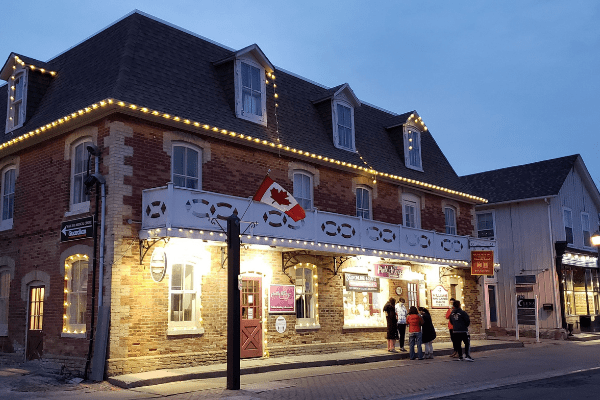
Restaurants & Nightlife
Chinese and Asian cuisine dominate the restaurant industry in the city, but the city does have restaurants featuring food from around the world. The city holds many festivals throughout the year. Some to check out include the Night It Up! Night Market, Taste of Asia Festival, Unionville Festival, Markham Village Music Festival, Markham Jazz Festival, Markham Ribfest & Music Festival, Doors Open Markham, Thornhill Village Festival, Markham Fair, Olde Tyme Christmas Unionville, and Markham Festival of Lights.
Nature & Natural Landscapes
Markham has over 22 km of scenic pathways. Some of the natural landscapes to experience are Milne Dam Conservation Park, Bob Hunter Memorial Park, and Pomona Mills Park.
Sporting Events & Concerts
Even though the city doesn’t have a professional sports team, it’s only a short drive to Toronto to see the Maple Leafs, Raptors, and Blue Jays. To see live music, check out the local listings for MFG Complex, and other venues throughout the GTA.
Culture & Diversity In Markham
Diversity
Markham is very diverse. About 78% of the population identifies as a visible minority, with 6% being recent immigrants. There is a significant Chinese population in the city. Close to half of the residents are of Chinese descent. The biggest minority groups are Chinese (46.5%), Indian (10.1%), Sri Lankan (4.4%), Irish (4.2%), Italian (3.7%), Filipino (3.1%) and Iranian (2.5%). One-third of the population’s mother tongue is Cantonese or Mandarin.
Worship
Markham is culturally diverse and this is reflected in the number of religions that are practiced in the area. 44% of the population identify as Christian. Others identify as Hindu (9.8%), Muslim (7.5%), Buddhist (4.4%), Jewish (2.4%), and Sikh (1.4%). About 30% of the population has no religious affiliation.
The Weather in Markham
Markham has a continental climate that is like the rest of Southern Ontario. The city experiences all four seasons of weather (spring, summer, fall, and winter). The temperature will vary greatly by season. The average temperature in January is about -6o C and the average high temperature in July is 26o C.
Common Questions Immigrants Ask About Living in Markham
Why is Markham a Good City for Immigrants?
As one of the most diverse cities in all of Canada, Markham is a popular landing spot for new immigrants, especially people of Asian heritage. The city offers great job opportunities and is only a short drive to Toronto, the biggest city in Canada.
What are the Potential Disadvantages of Living in Markham for Newcomers?
One of the main disadvantages of living in Markham is the cost of living. Everything from real estate to restaurants and transit are more expensive than other smaller cities in Canada. However, you also have a better chance of getting a higher-paying job.
What are the Benefits of Living in Markham?
Markham is a high-tech hub. So, if you work in the technology field, the city is a desirable destination for you to find work. There are many great outdoor trails, public transit, and you are close to other cities in Ontario.
Deciding to move to Canada is life-changing. A new country brings about new opportunities and a new way of life. Richmond Hill, Ontario is one of the many cities in the Greater Toronto Area to consider.
But before you choose a new city to call home, it’s important to carefully research your options. There are many cities in Canada and they are all unique. So smart things to consider include career options, the regional location, the housing market, and the overall lifestyle a city can offer. Where you live will affect both your financial success and overall quality of life in Canada.
Is Richmond Hill near the top of your list of cities you are considering? Prepare for Canada can guide you with helpful information.
About Richmond Hill, Ontario
Richmond Hill is a diverse city that is located in York Region. The region includes nine municipalities: Aurora, East Gwillimbury, Georgina, King, Markham, Newmarket, Vaughan, Whitchurch-Stouffville, and the City of Richmond Hill. York Region is also part of the Greater Toronto Area (GTA) and is about 36 km from Toronto. The village of Richmond Hill was incorporated in 1872. It received town status in 1957 and city status in 2019.
Richmond Hill has seen significant growth since the 1990s. Thanks to its strong economy, job opportunities, and the quality of life it provides, it attracts thousands of young and skilled immigrants each year.
How Many People Live in Richmond Hill, Ontario?
202,000 people live in Richmond Hill, according to the 2021 Census. This is an increase of 3.6% since 2016. The city is the third-largest in York Region and the 27th largest in Canada. Over 60% of the population are visible minorities. This is well over 100,000 residents.
How to Find a Job & Build a Career in Richmond Hill
Richmond Hill’s Local Economy
The city has a diverse economy that is made up of small businesses and corporate headquarters. It is becoming known for IT and high technology with over one thousand businesses in this industry.
Other leading industries you’ll find here are:
- Insurance and Finance
- Professional Services
- Healthcare.
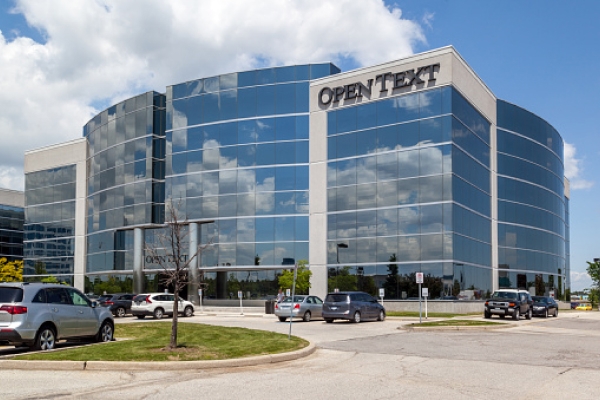
Major Employers in Richmond Hill
The city has a wide range of employers in many industries. Some of its top employers include:
- Apotex
- BMW
- OpenText
- Compugen
- Mackenzie Richmond Hill Hospital.
Career Pathways in Richmond Hill
You can search for jobs on the City of Richmond Hill website. Working with a recruitment agency is also a common way to search for employment. Top recruitment agencies include Randstad Canada, AppleOne Employment Services, and Robert Half.
The Richmond Hill Housing Market
Richmond Hill continues to grow, much like other parts of the York Region. It offers newcomers a variety of housing options. You can choose to rent or buy when you move to the city. Main neighbourhoods include:
- Oak Ridges
- Bayview North
- Doncrest
- Elgin Mills
- Headford
- Hillsview
- Mill Pond
- Richvale
- Bayview Hill.
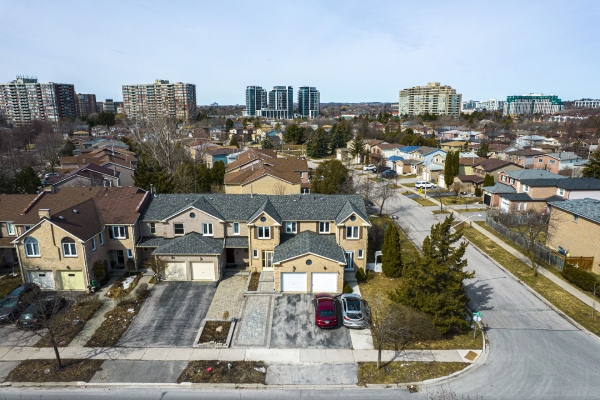
Is Housing Expensive in Richmond Hill, Ontario?
Housing in the city is expensive. It is one of the most expensive cities in Ontario to rent or buy. It is a highly desirable place to live, which can make finding affordable options more challenging.
Finding a Place to Rent in Richmond Hill
Compared to other cities in the GTA, Richmond Hill is an affordable place to rent. But it is still expensive overall. According to Zumper, the median cost to rent a one-bedroom is $2,173 for a one-bedroom. It is $2,700 for a two-bedroom and $3,190 for a three-bedroom unit. Housing availability can be an issue, and with low vacancy rates, come rising rental costs.
Use Rentals for Newcomers to search for available rental units in Richmond Hill. Here, you can also find current rental prices in Richmond Hill.

When renting a home or apartment, it’s also important to consider buying renter’s insurance to protect your family, belongings, and finances.
Get more information about renting a home:
Renting in Canada: What Newcomers Need to Know
Buying a Home in Richmond Hill
It is expensive to purchase a home in Richmond Hill. Prices have increased by once 12% in the past year and they continue to climb. The average price to buy a home is $1.5 million as of April 2022 according to real estate website Zolo.
The average price for a 3-bedroom townhouse is $1.3 million and the average price for a condo is $734,000. Find out more about buying your first home in Canada: First Time Home Buyer: Newcomer Tips
Driving & Public Transit
Driving in Richmond Hill, Ontario
Highway driving is part of daily life in Richmond Hill. It’s common for residents to commute to work in other parts of the GTA. There are several major highways in the area. They are Highway 404/ Don Valley Parkway, Highway 7, Highway 407 toll expressway, and Highway 401. Heavy traffic is common in these areas.
All residents are required to have a valid Ontario driver’s licence. The province uses a graduated licencing system. Learn more about licencing requirements on the Ministry of Transportation (MTO) website.
Get more information about driving in Canada:
Driving in Canada: 10 Essential Facts to Know
Getting Your Ontario Drivers License
Driving Test in Canada: A Full Guide
Tips for Winter Driving to Ensure Your Safety
Richmond Hill Public Transit
York Region Transit (YRT)/Viva has 120 routes across the nine municipalities of the York Region and offers easy access to the transit systems in the neighbouring City of Toronto, Peel Region, and Durham Region. To plan your trip with YRT/Viva, visit their website.
Toronto Transit Commission (TTC) has routes that operate in the York Region and bring passengers to some of the Toronto subway stations. GO Transit offers trains and bus services from Union Station in Toronto to York Region. For fare information when using the TTC and GO Transit connecting services click here.
Community Support for Newcomers
As a city with a diverse population, it offers a wide selection of support for newcomers. All new immigrants have access to programs that help to settle in the city. Among many of the services, you can get help to look for work, find housing, and improve your language skills.
York Region’s Local Immigration Partnership (LIP) offers support to newcomers. Welcome Centre Immigration Services has seven locations in York Region, including in Richmond Hill. You can get general information in fifteen languages.
Language Support
You can take language classes through Settlement.org, Welcome Centre Immigrant Services, Immigration Settlement Services, and many other community groups.
Personal Finance & Banking
Setting up a bank account and getting your finances in order upon moving to Richmond Hill is an important step in getting settled. All local banks and credit unions offer services specifically for new immigrants. They can help you open a bank account, get a credit card, apply for loans, and get a mortgage.
Get more banking tips for newcomers:
Top 10 Financial Steps to Take Before You Leave for Canada
Move to Canada | Transferring Cash & Valuables
Open a Bank Account Before Arriving in Canada
Richmond Hill’s Education System
Richmond Hill has many education options for children and adults. There are two main school boards – York Regional District School Board and York Catholic District School Board.
While the city does not have a post-secondary institution, you can get access to top colleges and universities throughout the GTA. Parents have access to many preschool and daycare options. There are before and after school programs, and private, public, and community childcare programs across the city.
Elementary and High School Education
Residents have access to public, Catholic, and private school education. The York Regional District School Board has twenty-seven elementary and five high schools. The York Catholic District School Board has thirteen catholic elementary and two high schools. There are also four private primary schools and five private high schools.
Post Secondary Institutions
There are no colleges or universities in Richmond Hill. But there are satellite campuses of York University, University of Toronto, and Seneca College located in York Region.
Read more about education in Canada:
Schooling in Canada | A Look at the Education System
Higher Education Offers Benefits to Newcomers
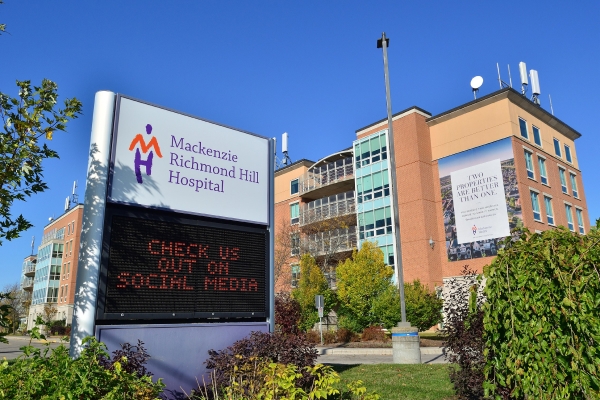
Where To Get Medical Care in Richmond Hill, Ontario
Most basic health care services in Ontario are publicly funded. Richmond Hill residents are covered by the Ontario Health Insurance Plan (OHIP). Prescription drugs and some other medical services are not covered by OHIP, but you can pay for additional health insurance plans.
Mackenzie Richmond Hill Hospital offers a full-service emergency department, and core and specialized services to provide the health care you need. In case of a medical emergency (when there is a life-threatening condition) call 9-1-1.
York Region Emergency Medical Services works 24 hours per day and uses up to thirty-three ambulances, nine rapid response vehicles and four special response vehicles.
How to Find a Family Doctor
When you arrive, finding a family doctor will be important so that you can receive primary medical care. Family doctors can prescribe medication and refer their patients to specialists and hospitals. Not all family doctors accept new patients, so if you have difficulty finding a health care provider, you can enroll in the Ministry of Health Health Care Connect Program.
If you need medical care, but still don’t have a doctor, you can go to a walk-in clinic. Get more information about health care in Canada: Steps to Access Free Health Care in Canada
What is Day-to-Day Life Like in Richmond Hill?
Things to Do in Richmond Hill
Richmond Hill’s location within the GTA offers newcomers many different things to do. Whether you enjoy the outdoors, culture, the arts, or sports, there is something for everyone.

Public Spaces & Attractions
The city offers residents a variety of attractions to explore. Some of the most popular are the David Dunlop Observatory, Hillcrest Mall, Richmond Hill Heritage Centre, and the Hillcrest Farmer’s Market.
Restaurants & Nightlife
Richmond Hill has a variety of neighbourhoods that offer cuisine from many cultures. Yonge Street is the best spot to discover many unique restaurants, pubs, and bars.
Nature & Natural Landscapes
There are many outdoor spaces for nature lovers. You can go for a hike at Oak Ridges Trail or Rouge River Headwaters Walk, check out Wilcox Lake, Saigeon Trail walkways above wetlands and Oak Ridges Corridor Conservation Reserve.
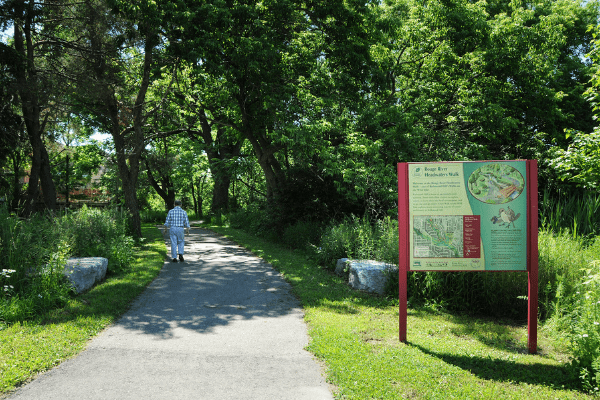
Sporting Events & Concerts
Even though the city doesn’t have any professional sports teams, it’s only a short drive away to Toronto to see the Maple Leafs, Raptors, Toronto FC, and Argos. You can check out live performances at the Richmond Hill Centre for the Performing Arts. Again, there are countless world-class concert venues only a short drive away.
Culture & Diversity in Richmond Hill

Diversity
Richmond Hill is a culturally diverse city. Over 60% of the population identifies as a visible minority. This is about 120,000 residents. Residents speak 126 languages.
The largest minority population is Chinese, which make up 30% of residents. Other large immigrant communities include Iranian (11%), Italian (10%), East Indian (5.8%), and Russian (5.4%).
Each year, the city celebrates its cultural diversity through the annual Culture Days events. The event raises cultural awareness through visual arts, music, dance, film, food, and media.
Worship
As a diverse city, residents practice different religions. About 50% of the population identifies as Christian. This is followed by Islam (11.5%), Judaism (5.5%), Buddhism (2.8%), and Hinduism (2.4%). About one-quarter of the population has no religious affiliation.
Place of Worship in York Region:
The Weather in Richmond Hill
Richmond Hill has a humid continental climate with four seasons. Winters are cold with the daily average temperature in January of -7°C. Temperatures often feel colder than they are because of the wind chill. Snow can fall anytime between November and April. Snowstorms are not unusual.
Summers are hot and humid with temperatures ranging from 20°C to 31°C. However, the high humidity makes temperatures feel warmer than they are. Spring and autumn are cool and pleasant, sometimes with large differences between day and night temperatures.
Common Questions Immigrants Ask About Living in Richmond Hill
Is Richmond Hill a Good Place for Immigrants?
Yes. It’s regarded as one of the best places to live and work in Canada. Its truly diverse population makes it an attractive destination for new immigrants.
What are Some Disadvantages of Living in Richmond Hill for New Immigrants?
While it is a great place to live, Richmond Hill is one of the most expensive cities in Ontario. If you don’t enjoy commuting, you won’t like the traffic. Your location could limit your job opportunities.
What are the Benefits of Living in Richmond Hill?
Richmond Hill gives you the calm and quietness of a small town while still located close to Toronto, a major city. There are many outdoor activities and it is a great location for commuters. Most of the residents are families with children.
Are you thinking about moving to Canada? Many new immigrants choose the province of Ontario, and the city of Windsor specifically, as their new home. Where you choose to move is a decision that will affect your life for years to come.
Before choosing a destination city, it’s vital to research the cost of living, the housing market, local economy, education options, and things you can do for fun.
Windsor, Ontario is located in Southwestern Ontario on the United States border with Detroit, Michigan. It is known as the “Automotive Capital of Canada.” The city is also surrounded by a rich agricultural region in Essex County.
Learn more about the city and get helpful information about living and working in Windsor.
About Windsor, Ontario
Windsor is the southernmost city in Canada and home to the Ambassador Bridge, the busiest commercial border crossing between Canada and the United States.
The area was originally settled in 1749 as a French agricultural region. Then in 1797, post-American Revolution, it was established as a settlement named “Sandwich.” It was later incorporated as the city of Windsor in 1854, after the town in Berkshire, England.
Today, the city is a major contributor to the auto industry in Canada. It’s known for its industrial and manufacturing industries. It is a hub for commercial transportation and has grown to the third-largest city in Southwestern Ontario, behind London and Kitchener-Waterloo.
How Many People Live in Windsor, Ontario?
According to the 2021 census data, the city has a population of 229,660 people. This makes it the 15th largest city in Canada and the 7th largest in Ontario. Since 2016, the population has grown by 6.3%. The Windsor and Detroit area is the most populated trans-border area in North America.
How to Find a Job & Build a Career in Windsor
Windsor’s Local Economy
Windsor is a well-known leader in the automotive industry. There are more than 90 auto and parts manufacturers located in the region. This includes Ford Motor Company and Fiat Chrysler. It is also a tourism destination due to its proximity to the U.S. border. The main drawback of the local economy is its relatively high unemployment rate compared to other cities in the province. It sits at 10.7% (as of February 2022). The national average is 7.7%.
The top industries are:
- Automotive
- Manufacturing
- Government services
- Tourism
- Education.
Major Employers in Windsor
Most of the major employers in this city are found in manufacturing. Other employers include:
- Stellantis
- Ford Motor Company
- FCA Canada
- AP Plasman Corp.
- Sutherland Group Canada.
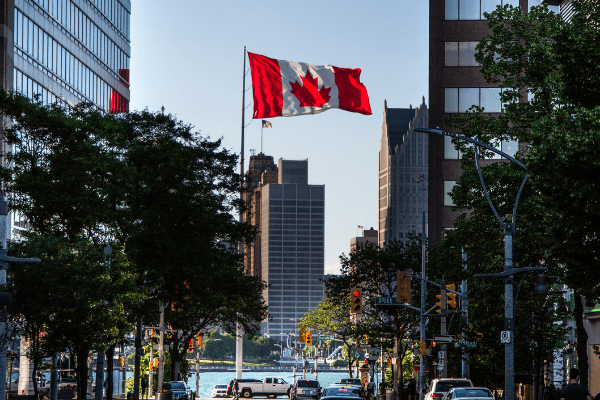
Career Pathways in Windsor
Auto and parts manufacturing is the top industry for those looking to work in Windsor. There are a few ways to search for jobs in the city. You can look for work using workforce WindsorEssex, Government of Canada Job Bank, and local employment recruiters. They include Aerotek, Prostaff Employment Solutions, Canadian Executive Search Group, and others.
The Windsor Housing Market
There are plenty of housing options. The city is divided into four distinct sectors: Downtown, East End, West Side, and South Side. Within each of these areas, there are unique neighbourhoods. For example, some are geared to young families, others to older adults, singles, or even a mix of residents. Before you decide where to live, consider how suitable the neighbourhood is for your lifestyle.
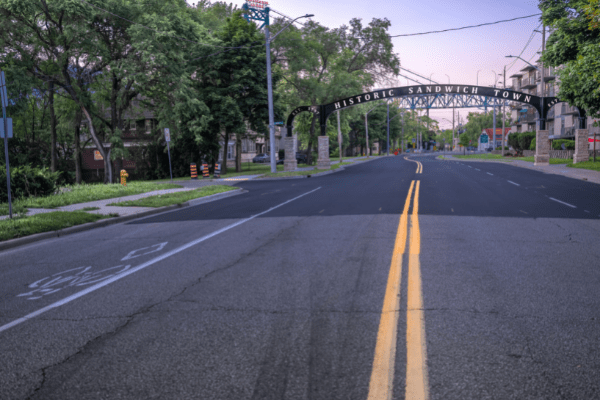
Is Housing Expensive in Windsor, Ontario?
Windsor is one of the most affordable large cities in Ontario. Even with rising house prices, the city has not seen a steep increase like other large cities in the province. Housing costs are still lower than the national average.
Finding a Place to Rent in Windsor
Windsor has rental units available across the city. Rent can start at as low as $900 per month and up. The average rent for an apartment is $1,142 for a Bachelor, $1,181 for a 1 Bedroom, $1,396 for a 2 Bedroom, and $1,698 for a 3 Bedroom. Rental rates are more affordable than in many other cities in Ontario.
Searching online is an effective way to find available units. Use Rentals for Newcomers to search for available rental units in Windsor. You can find current rental prices and available units in Windsor.
When renting in Canada, consider buying renter’s insurance to protect you and your family in the event of damage, a break-in, or a fire. As well, most property owners today will require that you have insurance as part of your rental agreement.

Buying a Home
Windsor is one of the most affordable larger cities. According to Royal LePage, the average price of a home in Canada is now $779,000 (as of January 2022). And the average price for a single-family home in Windsor is $553,100 as of February 2022, according to The Canadian Real Estate Association. The average price for a townhouse is $433,900 and the price for a condo/ apartment unit is $346,600.
Find out more about buying your first home in Canada: First Time Home Buyer: Newcomer Tips.
Driving & Public Transit in Windsor
Driving in Windsor, Ontario
As the southernmost city in Ontario, Windsor is the endpoint for the Quebec City-Windsor Corridor. It is the final stop for Highway 401 and Via Rail. Local highways such as E.C. Row Expressway and Highway 3 connect the city to surrounding communities.
The city has two border crossings, the Ambassador Bridge, and the Detroit-Windsor Tunnel. There is also a Canadian Pacific Railway tunnel, and the Detroit–Windsor Truck Ferry.
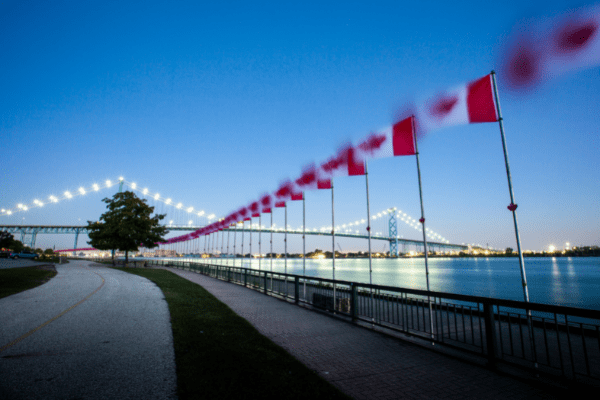
With an international border, there is significant commercial traffic. All drivers must have a valid Ontario driver’s licence.
Get more information about driving in Canada:
Driving in Canada: 10 Essential Facts to Know
Driving Test in Canada: A Full Guide
Getting Your Ontario Drivers License
Tips for Winter Driving to Ensure Your Safety
Windsor Public Transit
Transit Windsor supplies bus service to the community. It runs 15 bus routes. Service extends to LaSalle, Essex, Kingsville, and Leamington. There is also service to downtown Detroit via Tunnel Bus for special events and for those who work or go to school across the border.
Community Support for Newcomers
The Windsor Essex County Local Immigration Partnership offers a strong support system for newcomers. It is an initiative of Immigration, Refugees and Citizenship Canada (IRCC) to help communities offer comprehensive newcomer services. Other settlement agencies in Windsor include the YMCA of Southwestern Ontario, the Multicultural Council of Windsor-Essex County, and New Canadians’ Centre of Excellence Inc.
Learn more about Services in Canada to Help Newcomers Settle.
Language Support in Windsor
As a permanent resident of Canada, you are eligible for Language Instruction for Newcomers to Canada (LINC) offered by local settlement agencies. You can have your language skills assessed by the Language Assessment and Resource Centre.
Language support is offered by College Boreal, and other agencies such as Unemployed Help Centre, The Windsor Women Working With Immigrant Women, and Women’s Enterprise Skills Training of Windsor Inc.
Personal Finance & Banking
All newcomers need a good financial plan to help them have a successful transition to life in Canada. Local banks offer programs for new immigrants to help them open a bank account, get a credit card, qualify for a mortgage, and access other financial products. Visit your local branch or apply online.
Get more banking tips for newcomers:
Top 10 Financial Steps to Take Before You Leave for Canada
Move to Canada | Transferring Cash & Valuables
Open a Bank Account Before Arriving in Canada
Windsor’s School System
The province of Ontario oversees the school system in Windsor. Residents have access to public, private, and catholic education. And, the city is home to several post-secondary schools.
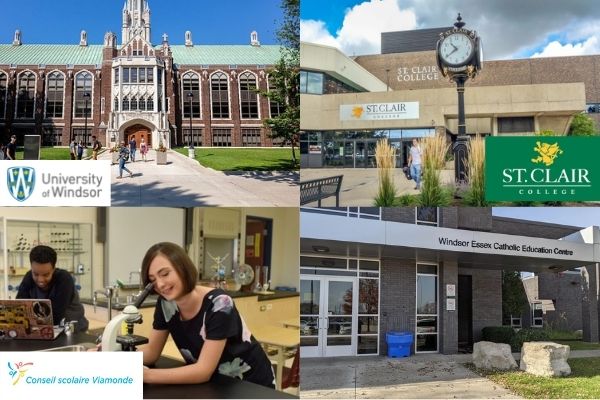
Elementary and High School Education
City of Windsor elementary and secondary schools are regulated by four school boards:
- Greater Essex County District School Board (Public English Board)
- Windsor Essex Catholic District School Board (Catholic English Board)
- Conseil Scolaire Catholique Providence (Catholic French Board)
- The Conseil Scolaire Viamonde (Public French Board)
Private school is also available to students from kindergarten to grade 12. In total, there are 55 elementary and 15 high schools.
Post Secondary Schools
Windsor is home to one university and two colleges. They are the University of Windsor, St. Clair College, and College Boreal. Collectively, they offer programs to over 20,000 students annually.
Read more about education in Canada:
Schooling in Canada | A Look at the Education System
Higher Education Offers Benefits to Newcomers
Where to Get Medical Care in Windsor, Ontario
There are two hospitals in the city, Windsor Regional Hospital and Hôtel-Dieu Grace Healthcare. These are the places to visit in case of a medical emergency. Windsor Regional Hospital also has formal and informal agreements with Detroit-area hospitals to provide expanded healthcare services.
For non-emergency care, visit a local walk-in clinic. In case of an emergency call 9-1-1. This number is the same no matter where you live in Canada.
Residents must obtain a health card to receive free medical care provided by the Ontario Health and Insurance Plan (OHIP). Click here to learn how to apply for OHIP. You can get additional coverage through private health insurance plans. Some employers offer medical benefits through their employee benefit plan.
How to Find a Family Doctor in Windsor
Finding a family physician is important to help you maintain your health. You can search for a family doctor by using Health Care Connect, through the Essex County Medical Society, or by using the College of Physicians and Surgeons of Ontario – Doctor Find. Doctor availability changes over time. So, you may be placed on a waiting list until a doctor becomes available.
Get more information about health care in Canada:
Steps to Access Free Health Care in Canada
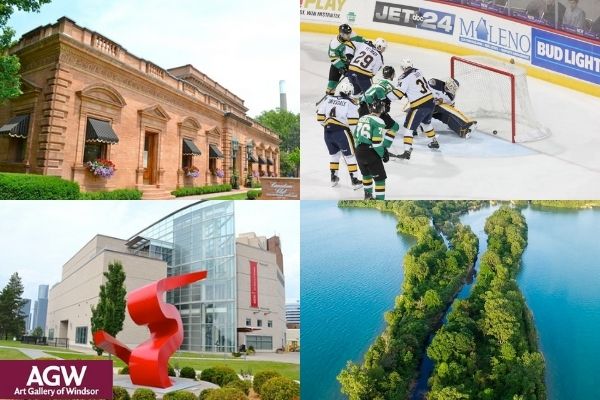
What is Day-to-Day Life Like in Windsor?
Things to Do in Windsor
This city offers residents a diverse list of things to do. From local festivals, biking on trails along the Detroit River, checking out musical acts and events at the casino, and enjoying the outdoors, there is something for everyone.
Public Spaces & Attractions
This city is well known for being the home of Caesars Windsor. But there is much more to do than test your luck. Great restaurants and events are happening all the time. Other great attractions in the area include The Canadian Club Brand Centre and Hiram Walker & Sons Limited distillery and the Art Gallery of Windsor. If you like waterparks, take the family to Adventure Bay Family Water Park.
Restaurants & Nightlife
In addition to the restaurants and nightlife at the casino, the city offers a great riverfront park system with fine restaurants. If you enjoy Italian food, check out Erie Street, Windsor’s Little Italy called “Via Italia”. You can also sample wine in the Lake Erie North Shore Wine Region in Essex County.
If you enjoy festivals check out the Windsor-Detroit International Freedom Festival during Canada Day, the Bluesfest International Windsor each July, and Detroit Windsor International Film Festival.
Nature & Natural Landscapes
Windsor has an extensive bike trail system that includes the Riverfront Bike Trail, Ganatchio Bike Trail, and Little River Extension. Other things to check out in the area include Peche Island, taking a walking tour of Ford City, or visiting the Ojibway Prairie Complex.
Sporting Events & Concerts
This city is home to the Windsor Spitfires of the Ontario Hockey League, Windsor Express of the National Basketball League of Canada, and a variety of minor league teams. You can check out local concerts at The Colosseum at Caesars Windsor, Rockstar Music Hall and other local music venues.
Culture & Diversity in Windsor
Diversity
This is the fourth most diverse city in Canada. There are more than 170 ethnicities and 70 languages spoken. About 23% of the population are immigrants. This is more than 75,000 residents. The biggest minority groups are Arab (7.4%), Black (4.9%), South Asian (4.4%), and Chinese (3.4%).
Worship
This city has a diverse religious community. About 40% identify as Catholic, 22% Protestant, 6.9% Muslim, and 4% Orthodox. 20% of residents have no religious affiliations.
The Weather in Windsor
Windsor has a humid continental climate. And because of its southern location, it has the warmest climate of all Ontario cities. Windsor actually has the same latitude as Northern California. The average temperature reaches above 10°C (50°F) 223 days of the year.
It gets less snow than other cities in the province. Summers are hot and humid, with an average temperate of 23 degrees Celsius. Winters are mild, with the temperature dipping down to an average of -3 degrees in January.
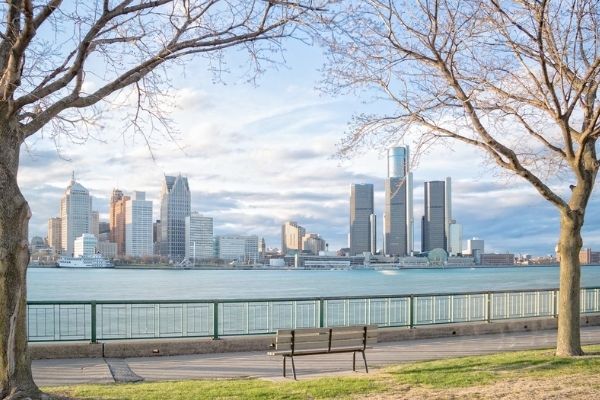
Common Questions Immigrants Ask About Living in Windsor
Is Windsor a Good Place for Immigrants?
Yes. Windsor is one of the most culturally diverse cities in Canada. It offers affordable housing and close access to the United States. There are largely Middle Eastern, Italian, Asian, and European communities.
What are the Benefits of Living in Windsor?
Windsor is known for having more affordable housing prices. You are only 10 minutes from Detroit and the city offers great entertainment options for a city its size. It is an ideal location if you plan to work in manufacturing or tourism.
What are Some Potential Disadvantages of Living in Windsor for New Immigrants?
The big potential drawback of moving to Windsor is the local economy. The city has a higher than normal unemployment rate. It is also relatively focused on industrial and manufacturing careers. But, on the other hand, being so close to Detroit also opens other career opportunities.

Are you moving to Canada? Thousands of immigrants come to the country every year. There are newcomers dispersed from coast to coast. One of the biggest decisions all newcomers must make is where they choose to live. While Barrie is lesser-known than a large city like Toronto, it’s a popular alternative to living in the Greater Toronto Area.
Where you choose to live will have a direct impact on your career options, financial success, housing costs, and overall lifestyle.
To find a lower cost of living and more affordable housing, many people are moving out of the city to more rural areas within the province of Ontario. Spending the time researching your options will help you choose the best city for you and your family.
Are you interested in learning more about the city of Barrie, Ontario? Read our guide below with helpful information about living in Barrie.
About Barrie, Ontario
Barrie, Ontario is a beautiful waterfront city located on the shores of Kempenfelt Bay, the western side of Lake Simcoe. It is a growing area that has become a popular destination for new immigrants and people moving out of Toronto as part of a recent interprovincial migration trend.
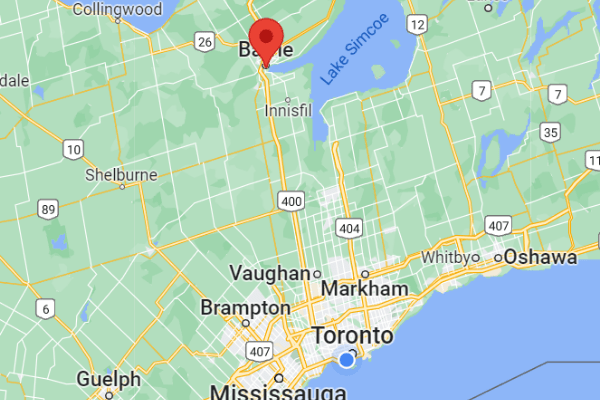
People are attracted to the region for several regions. It is a bedroom community of Toronto located about 90 km north of the city and about an hour’s commute. The lower housing prices and cost of living are appealing. There is large employment growth and it has a good transit system. The city is also ideal for people who love the outdoors because of the swimmable beaches and ski hills located nearby. There are many great hiking paths, great skiing, and many watersports.
Over the past few decades, it has evolved from a small town to an up-and-coming city. Barrie was first settled during the War of 1812 as a supply depot for British soldiers. The city was named after Sir Robert Barrie, an officer in the British Navy. Over the years it has evolved from a village (1854) to a town (1870), and became a city in 1959.
How Many People Live in Barrie, Ontario?
The population of Barrie has grown rapidly over the past few years. The city has recently made the list of the top 5 most moved-to cities in Canada. As of 2020, there were about 155,000 residents in the city. And the government of Ontario projects the city population could double to 300,000 residents by 2051. This is based on increased immigration and intra-provincial migration.
How to Find a Job & Build a Career in Barrie
Barrie’s Local Economy
The economy in Barrie is in a growth phase. As more people move out of the big city, businesses are choosing to invest in Barrie. The projected 70% population growth by 2041 brings new jobs and opportunities. Estimates project more than 30,000 new jobs will be created over the next 20 years.
Some of the biggest growth sectors are arts, entertainment, and recreation, manufacturing, finance and insurance, healthcare, and construction.
The top sectors in Barrie are:
- Manufacturing
- Security and cloud services
- Technology
- Food and beverage
- Life sciences
- Retail
- Tourism.
Major Employers in Barrie
Barrie is home to several corporate headquarters. There is an opportunity to work for larger organizations. Some of the major employers in Barrie are:
- Coca Cola
- IBM Canada Leadership Data Centre
- Sun Media
- Hydro One
- Scotiabank
- The Source
- The Royal Victoria Regional Health Centre
- Georgian College
- Napolean/Wolf Steel
- Russell Security Services.
Career Pathways in Barrie
There are several ways you can explore career opportunities. You can search the Government of Canada Job Bank or other online job boards. you can search for jobs online You can also use local recruitment agencies such as Randstad Canada, IS2 Workforce Solutions, TalentWorld, and AppleOne Employment Services.
For information, tools, free webinars, and more visit our Finding a Job in Canada resource page to get the help you need and achieve your career goals in Canada!
Related Post:
Ontario Canada | Population, Cities, Economy & Culture
The Barrie Housing Market
It is important to assess where you want to live within the city. Ideally, you want to choose a neighbourhood that is close to work, schools, and other amenities. But this has become more challenging in recent years as the city is experiencing some growing pains.
The availability of housing is one of the issues. With more people moving to Barrie, there is a smaller supply of housing options. Fortunately, there are new housing developments underway, that will offer newcomers more options soon.
Is Housing Expensive in Barrie, Ontario?
The housing market is more affordable than in other cities in the Greater Toronto Area, but with housing prices on the rise, the gap is shrinking. The lack of supply and not enough new builds are driving up the cost.
Finding a Place to Rent in Barrie
Renters in Barrie can choose from single-family homes, condos, apartments and townhouses in many unique neighbourhoods. To get a sense of the character of each neighbourhood, check out, Best Barrie Neighbourhoods for Renting.
There are a few ways you can look for rental units. You can search online, use realtor websites or you can use Rentals for Newcomers to search for available rental units in Barrie. Here, you can also find current rental prices in Barrie.
Rentals start at about $1,500 for a one-bedroom unit. The average rent for an apartment in Barrie is $1,842 for a 1 Bedroom and $2,199 for a 2 Bedroom. When renting, it’s a good idea to get  to protect your family, belongings, and finances.
to protect your family, belongings, and finances.
Get more information about renting a home: Renting in Canada: What Newcomers Need to Know.
[cjtoolbox name=’Renting Webinar’]
Buying a Home in Barrie
Buying a home in Barrie has become more expensive. For example, prices have increased by over 30% in the past year, and are predicted to increase by as much as 15% in 2022. The average price for a detached house in Barrie is $980,000. The average price for a townhome is $853,000 and the average cost for a condo is $626,000.
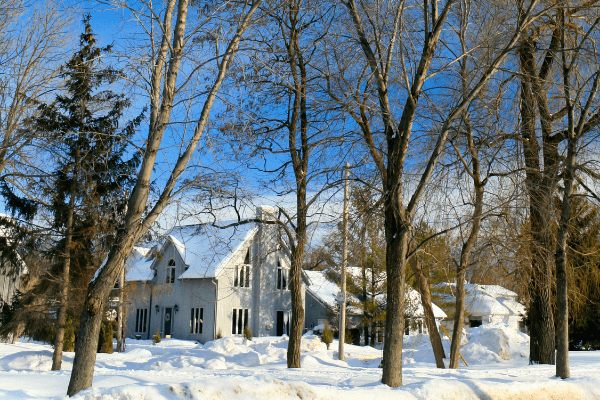
Find out more about buying your first home in Canada: First Time Home Buyer: Newcomer Tips
Driving & Public Transit in Barrie
Driving in Barrie, Ontario
Barrie is a commuter city. Many people drive to work within the city or to other locations across the Greater Toronto Area. Barrie is served by a strong road system. There are several highways in the area. Highway 400 is the major highway that goes between the city and Toronto. Highway 26 is the main highway that goes through the city and heads toward Collingwood. Other highways in the area include Highway 27, Highway 90, and Highway 93.
All drivers must have an Ontario driver’s licence. To get a licence you will need to complete the graduated licencing process. For information on driving in Canada and how to get a licence, see:
Driving in Canada: 10 Essential Facts to Know.
Getting Your Drivers License in Ontario
Driving Test in Canada: A Full Guide
Tips for Winter Driving to Ensure Your Safety
Barrie Public Transit
Barrie Transit provides public transit and bus routes throughout the city. As well, you can take advantage of daily GO Train and Bus service to downtown Toronto and other cities in the region. And, using public transit is a convenient, affordable, and simple way to travel within Barrie and across the region. Get more information about Barrie Transit fares.

There are no major airports in the city. The closest is Lake Simcoe Regional Airport.
Community Support for Newcomers
Barrie and Simcoe County offer support services to new immigrants who move to the community. You can get information about living and working in the community.
Some of the settlement agencies include the YMCA of Simcoe/Muskoka Immigrant Services, The Learning Centre, Georgian College, and Bradford Immigration & Community Services (BICS).
For more information, tools, and free webinars about living in Canada visit our Settling in Canada resource page to help with your settlement needs.
Language Support in Barrie
Many community agencies offer free language classes. In Barrie, you can take courses at The Learning Centre, Georgian College, and through the YMCA Immigrant Services. Or, you can also take courses with the Simcoe County District School Board in the Adult English as a Second Language program.
Personal Finance & Banking
Having a strong financial management plan is important for new immigrants. Newcomers have access to banks, credit unions, and other financial institutions where you can open a bank account, get a credit card, or line of credit, and apply for a mortgage. Most banks and financial institutions offer specific products and programs for new immigrants. Visit a local branch to open an account. You will need proof of residence and proper identification.
For more information about your financial first steps in Canada, visit our Banking in Canada resource page.
Related Posts:
Top 10 Financial Steps to Take Before You Leave for Canada
Move to Canada | Transferring Cash & Valuables
Open a Bank Account Before Arriving in Canada
Barrie’s Education System
The Government of Ontario manages the school system, including elementary, high school, and post-secondary education.
Elementary and High School Education
Barrie offers residents several elementary and high school education options. You have the choice to attend the public or Catholic school board. It also has two French school boards and several private schools. You can enrol your children at a school with one of the following:
- Simcoe County District School Board
- Simcoe Muskoka Catholic District School Board
- Conseil scolaire catholique MonAvenir
- Conseil scolaire Viamonde.
Post Secondary Institutions
Located in Barrie is Georgian College of Applied Arts and Technology. It offers over 130 full-time career-focused programs. There are over 13,000 full-time students including 4,500 international students from over 85 countries.

Related Posts:
Schooling in Canada | A Look at the Education System
Higher Education Offers Benefits to Newcomers
Where to Get Medical Care in Barrie, Ontario
Top-quality health care is something we value as Canadians. In Barrie, you can get urgent care through the Royal Victoria Regional Health Centre. You can also go to walk-in clinics throughout the city to receive care for non-urgent needs.
In case of an emergency call 9-1-1. This number is the same no matter where you live in Canada.
The Ontario Health Insurance Plan (OHIP) provides residents with health care coverage. Learn how to apply for an OHIP card.
You can also pay for additional  to help cover the costs of prescription drugs and services that are not covered by OHIP. Some employers offer third-party health insurance through their employer benefits packages.
to help cover the costs of prescription drugs and services that are not covered by OHIP. Some employers offer third-party health insurance through their employer benefits packages.
Related Post:
Steps to Access Free Health Care in Canada
How to Find a Family Doctor in Barrie
Finding a family doctor is an important step to ensure you are caring for your health. You can search for a family doctor who is taking on new patients through Health Care Connect. You can call 1-800-445-1822 or visit www.ontario.ca/findadoctor to search online.
What is Day-to-Day Life Like in Barrie?
Things to Do in Barrie
As a waterfront community, Barrie offers many year-round activities for residents. You can enjoy the beaches in the summer and head over to nearby ski clubs in the winter. And it is only a short drive to many other outdoor adventures. Downtown Barrie is at the heart of it all.
Public Spaces & Attractions
The city offers many local attractions including the Simcoe County Museum, Fort Willow, Centennial Park, and Bear Creek Eco Park. If you are into the arts and theatre, check out Five Points Theatre or Maclaren Art Centre. Be sure to check out the iconic Spirit Catcher sculpture.
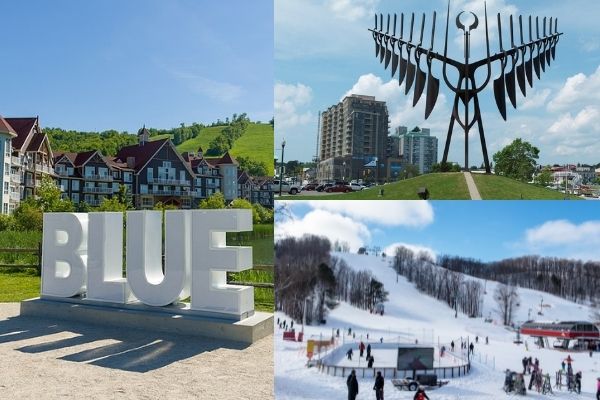
Restaurants & Nightlife
Downtown Barrie is the place to go to have dinner or enjoy entertainment and cultural activities. The city hosts many festivals such as Kempenfest, Barrie Waterfront Festival, Winterfest, and the Barrie Film Festival.
Nature & Natural Landscapes
Located on Lake Simcoe, Barrie provides residents with the opportunity to walk along the waterfront, go boating and enjoy the beach life in the summer months. Be sure to check out the beaches at Minet’s Point, The Gables, Tyndale, Centennial, and Johnson’s Beach.
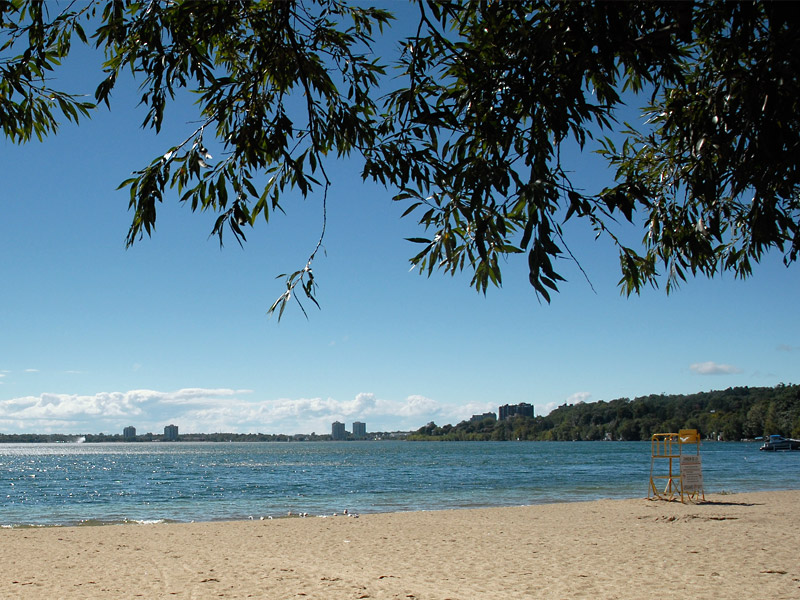
In the winter, Horseshoe Resort, Snow Valley and Blue Mountain are great for skiing, snowboarding, and tubing. Or check out nature at Arboretum Sunnidale Park.
Sporting Events & Concerts
Barrie is home to the Barrie Colts of the Ontario Hockey League, and other minor sports teams. If you want to catch a concert, check out Sadlon Arena or Burl’s Creek Event Grounds, which is home to the popular country music festival Boots and Hearts.
Culture & Diversity in Barrie
Diversity
Barrie is not traditionally known as a diverse city, but it is on the path to becoming more diverse. There are about 20,000 immigrants in the city. 7.6% of the population are minorities and 5% are Aboriginal. The city has a large francophone community with close to 10,000 residents being bilingual.
The largest minority groups are Black (2.7%), South Asian (2.2%), Chinese (1.2%) and Latin American (1.1%).
Worship
Barrie is mainly a Christian community. Around two-thirds of residents identify as Catholic, United, or Anglican. About 30% of the population has no religious affiliation. About 1-2% of the population identify with another religion.
The Weather in Barrie
Barrie has a climate like the rest of southern Ontario. They experience warm and humid summers and cold winters. It is a humid continental climate. The region experiences heavy thunderstorms in the spring and summer.
In the winter, the city gets significant snowfall, largely because it is close to Georgian Bay, Lake Ontario. The average temperature is -8.1 C in January and +21.0 C in July.
Common Questions Immigrants Ask About Living in Barrie
Is Barrie Ontario a Good Place to Live for Immigrants?
Barrie is a mid-sized city that offers a slower-paced lifestyle than living in a large city such as Toronto. Though Barrie is known for being more traditional, it is becoming a more diverse city. Barrie was named the safest city in Ontario to live in. If you are into the outdoors and cottage lifestyle, it’s a great place to consider.
What are the Advantages and Disadvantages of Living in Barrie?
It’s vital to consider the pros and cons of a city before you choose where you want to live. On the plus side, Barrie is a great location, with a growing job market, a safe community and offers many great seasonal activities. On the downside, it’s less diverse than a city such as Toronto and other potential issues such as road congestion, challenging winters, and rising housing costs.
Is Barrie Ontario Expensive?
Barrie is more affordable than many cities in the Greater Toronto Area, but housing prices are rising as the city has become a prime location for interprovincial migration. As well, many Toronto residents are moving to Barrie. As a result, the cost of housing is rising.
For more information, tools, and free webinars about living in Canada visit our Settling in Canada resource page. We’ll help you to settle successfully!
If you are thinking about what it would be like to live in Toronto, it’s good to know that it’s a top destination for newcomers to Canada. That’s not surprising as Toronto is the largest and one of the most diverse cities in Canada. If you’re wondering what it would be like to live in Toronto, these helpful insights cover everything from employers to housing costs. Toronto is truly an international city making it an exciting place to live! People can quickly acclimate to local cultural communities to ease their transition to Canada.
But where you choose to live will greatly impact your career and finances. Living in Toronto is expensive. So, you have to compare the pros of living in Canada’s biggest city versus other locations in the Greater Toronto Area or across the county. You must factor in the job market, career opportunities, housing availability and cost, and overall quality of living. Prepare for Canada can guide you with helpful information about living in Toronto.
About Toronto, Ontario
Toronto is the financial capital of Canada. About 40 percent of Canada’s business headquarters are here, including the country’s largest banks. Toronto is the capital of the Province of Ontario and is located on the north shore of Lake Ontario.
It was settled in 1750 as Fort Rouille. It was established as York in 1793 and incorporated as Toronto in 1834. The city amalgamated with neighbouring towns in 1953 as Metro Toronto. It wasn’t until 1998 that it amalgamated as the City of Toronto. And the city continues to undergo great development.
Known as the ‘city of neighbourhoods’ Toronto is conveniently divided into regions. Toronto of the past was just the central downtown and close surrounding area. But in 1998, the City of Toronto expanded and now has more than a whopping 240 neighbourhoods, making this great city…even greater. In total six districts make up the city: East York, Etobicoke, North York, Old Toronto, Scarborough, and York.
The Greater Toronto Area includes the City of Toronto and four regional municipalities surrounding it:
- Durham Region: includes Pickering, Ajax, Whitby, Oshawa, Clarington, Uxbridge, Scugog, and Brock.
- Halton Region: includes Burlington, Oakville, Milton, and Halton Hills.
- Peel Region: includes Brampton, Mississauga, and Caledon.
- York Region: includes Aurora, East Gwillimbury, Georgina, King, Markham, Newmarket, Richmond Hill, Vaughan, Whitchurch-Stouffville.
How Many People Live in Toronto, Ontario?
Toronto has a population of 2.8 million (2021 census). It is the most populated city in Canada with a density of 4,334.2 people per square km. 47% of people who live in Toronto are a member of a visible minority, making it the most ethnically diverse city in the country. It is estimated that half of the population are immigrants.
The population of the Greater Toronto Area is much larger at 6.4 million. And the area is growing. The city expects to add another 1 million residents in 25 years.
How to Find a Job & Build a Career in Toronto
Toronto’s Local Economy
Toronto’s diverse economy creates unlimited business and professional opportunities. It has a presence in everything from technology to green energy, film, retail, and financial services. It is the second-largest financial services centre in North America.
Toronto-based businesses export over $70 billion in goods and services to every corner of the globe with retail sales of $62 billion annually. The city’s economy relies on innovation and new ideas to create economic wealth.
Toronto’s key industries include:
- Financial services
- Aerospace
- Design
- Education
- Film
- Fashion
- Food & Beverage
- Green energy
- Biotechnology and Life sciences
- Information and Communications and Technology
- Tourism.
Major Employers in Toronto
This city is home to major employers in many industries. The top employers in the region are:
- Canada’s Big Five banks – Scotiabank, Royal Bank of Canada, Canadian Imperial Bank of Commerce, TD Canada Trust, and Bank of Montreal.
- Proctor & Gamble Inc.
- Questrade, Inc.
- Salesforce
- Walmart Canada Corp.
- University of Toronto
- And many others.
The city is also home to 9 of Canada’s 10 largest law practices, 9 of the top 10 accounting firms, and all 10 top human resources and benefits firms.
Career Pathways in Toronto
Approximately 35% of jobs are in downtown Toronto across all sectors including finance, technology, retail, and service. Toronto is North America’s fastest-growing tech market, offering unique career opportunities.
As the city has a thriving tourism industry, there are plenty of jobs in hospitality and customer service. The wages here are higher than anywhere else in Canada. But so is the cost of living.
You can get help with your job search by working with local recruitment agencies such as Randstad Canada, IQ Partners, Pure Staffing Solutions Inc., Motion Recruitment, and Boost Agents.
The Toronto Housing Market
Where you live is one of the biggest decisions you’ll make when you move to a new city. It’s important to consider cost and availability. Because it’s expensive to live in Toronto, given the high cost of housing, many people choose to live in surrounding cities in the GTA.
Is Housing Expensive in Toronto, Ontario?
According to Mercer Canada, Toronto was the second most expensive city in Canada in 2021. As well, housing prices continue to climb and the median price to rent a condo or apartment is over $2,000 per month.
So while many newcomers want to live in Toronto for convenience and lifestyle, it comes with higher home purchase and rental prices.
Living further from the downtown core means you’ll likely be able to afford a larger home in a quieter setting. But, if you work downtown, your daily commute will be longer.

Finding a Place to Rent in Toronto
Only Vancouver has more expensive rental rates than Toronto. Unfortunately, it’s not as simple as moving to other cities in the GTA. They also have expensive rentals. The average cost to rent an apartment or condo in Toronto is $1440 for a Bachelor, $1875 for a 1 Bedroom, $2427 for a 2 Bedroom, and $3181 for a 3 Bedroom.
Use Rentals for Newcomers to search for available rental units and current rental prices in Toronto.
If you plan to rent, you should consider buying  . This will offer you protection for your personal belongings and protect your family. Your landlord’s insurance will not protect you. Get more information about renting a home: Renting in Canada: What Newcomers Need to Know
. This will offer you protection for your personal belongings and protect your family. Your landlord’s insurance will not protect you. Get more information about renting a home: Renting in Canada: What Newcomers Need to Know
Buying a Home in Toronto
Buying a home in this city is expensive and prices continue to rise. The city has always had some of the highest real estate costs, but a recent shortage of homes available for sale is driving up the price even more.
According to Royal LePage, the average cost to buy a home in the City of Toronto increased by 8.1% year over year in 2021. The median price to buy a home is $1,138,000, $1,580,500 for a single-family detached home, and $711,200 to buy a condo.
In the GTA, prices increased by 17.3% with the median price being $1,119,800. Single-family detached homes are $1,421,200 and condos are $665,400. Find out more about buying your first home in Canada: First Time Home Buyer: Newcomer Tips
Driving & Public Transit in Toronto
Driving in Toronto, Ontario
Toronto has the busiest roadways in North America. It is the main hub for road, rail and air transportation in the province. It has an extensive highway system with over 400,000 vehicles per day that use Highway 401 alone. In total there are 2.5 million daily commuters. The city itself has close to 10,000 streets.
There are six major highways:
- Highway 401: The major east-west highway north of the city
- Queen Elizabeth Way/Gardiner Expressway: The major east-west highway south of the city
- Highway 407: Another major east-west highway on the north, however, you have to pay a toll for this highway
- Don Valley Parkway/Highway 404: The major north-south highway just east of downtown Toronto
- Highway 427: North-south highway on the west of the city
- Highway 400: North-south highway on the west side of the city
Drivers need to learn how to drive on busy highways, manage high-traffic volumes, and drive during winter conditions. You can start the graduated licencing process when you turn 16.
For more driving information see:
Driving in Canada: 10 Essential Facts to Know.
Driving Test in Canada: A Full Guide
Tips for Winter Driving to Ensure Your Safety
Toronto Public Transit
The City of Toronto and the other cities that make up the Greater Toronto Area are easily connected by public transit, including the subway, Rapid Transit (RT), buses, and streetcars. The Toronto Transit Commission (TTC) operates all transit within the city of Toronto. GO Transit operates the regional public transit service for the GTA. Public transit offers a great alternative to buying and operating a car in Toronto. And, because traffic congestion can be a challenge, many people who live in Toronto prefer to use public transit.
The cost of taking public transit varies depending on the method and distance. Learn more about the Public Transportation System in Toronto.
Pearson International Airport (YYZ) is one of the busiest in the world. It is in Mississauga along Highway 401. Toronto is also home to Billy Bishop Toronto City Airport (YTZ). All airports are accessible using public transit.
Community Support for Newcomers
There are many settlement agencies in Toronto to help newcomers adjust to living in a new country. Settlement agencies offer services such as finding a house, job, or childcare and getting information about healthcare and social services. You can get access to support and more information on the city’s Moving to Toronto page.
There are hundreds of settlement agencies in the Greater Toronto Area. To find one close to your home, click here. Learn more about Services in Canada to Help Newcomers Settle.
Language Support in Toronto
The city is also a mosaic of languages with more than 150 languages spoken every day in the city. Just over 30 percent of Toronto residents speak a language other than English or French at home. Hundreds of ethnocultural organizations – including professional associations and community centres – operate in the city.
311 offers information in more than 180 languages. You can also use the city of Toronto website in more than 50 languages.
Personal Finance & Banking
As a top financial hub, newcomers have access to different banks, credit unions, and financial institutions.
All banks in Toronto have programs to help new immigrants open a bank account get a credit card, or mortgage, and get help with other financial products. Visit a local bank branch in person or online to get started.
Get more banking tips for newcomers:
How Much Money Will I Need to Move to Canada?
Top 10 Financial Steps to Take Before You Leave for Canada
Move to Canada | Transferring Cash & Valuables
Open a Bank Account Before Arriving in Canada
Toronto’s Education System
The city of Toronto offers many education options from daycare, public, Catholic, francophone, bilingual, language immersion, private, and religious schools.
It also has many post-secondary schools which include three universities and five colleges that offer training for almost every profession and skill. If you are looking for child care services, click here to find licensed child care centres.
Elementary and High School Education
Education in Toronto is mandatory and every child between the ages of five and 16 must attend school. Like most other Canadian cities there are both public and private schools that provide learning opportunities for Toronto residents.
There are 583 public schools and 195 Catholic schools in the region. French-language public education and private school is also an option.
Students can attend schools on either board depending on which one their parents or guardians choose to support with their tax dollars. Ask at schools in your neighbourhood or contact the local school board for guidance.
Toronto Catholic District School Board
Post Secondary Institutions
Toronto is a Canadian leader in the number of post-secondary schools and graduates with more than 15,000 medical/ biotech researchers, two top-ranked MBA schools as well as excellent programs in engineering, computer sciences, and multi-media.
Universities include Ryerson University, York University, University of Toronto, and OCAD University. Colleges include Centennial College, George Brown College, Humber College, and Seneca College. Northeastern University Toronto is a private institution.
Read more about education in Canada:
Schooling in Canada | A Look at the Education System
Higher Education Offers Benefits to Newcomers
Where to Get Medical Care in Toronto, Ontario
Toronto has one of the highest standards in the world for health care and medical services. The city has an extensive medical community, world-class hospitals, and research facilities. There are over 30 hospitals located across the city. Toronto General Hospital is ranked as one of the top hospitals in the world.
In case of an emergency call 9-1-1. This number is the same no matter where you live in Canada.
Toronto residents are eligible for Ontario Health Insurance Plan (OHIP). This provincially-funded medical plan supplies free, essential hospital and medical care to all Ontario residents and permanent residents.
Applying for the OHIP card is one of the first things you do when you arrive to ensure you and your family receive vital health care. Or, you can also consider buying travel insurance that includes health coverage from a private company, especially if you have young children. See here for healthcare options in Ontario.
For prescription drugs and some services that Ontario Health does not cover, you can pay for additional  . Some people have third-party health insurance through their employer benefits packages.
. Some people have third-party health insurance through their employer benefits packages.
How to Find a Family Doctor in Toronto
Finding a family doctor is a crucial step to ensuring your health and well-being. Register with Health Care Connect to search for a family doctor. You may be put on a waiting list.
If you are unable to find a family doctor, you can go to one of many non-emergency walk-in clinics in the city. Get more information about health care in Canada: Steps to Access Free Health Care in Canada
What is Day-to-Day Life Like in Toronto?
Things to Do in Toronto
As the biggest city in Canada, Toronto has something to offer everyone. Whether you are a foodie, or sports fanatic, love art, music, theatre, or the outdoors, you’ll find many things to do in the city. There is always something going on. And. you can often find many free events or low-cost activities.
Public Spaces & Attractions
There are many world-class attractions in the city. Some of the top places to visit include the CN Tower, Royal Ontario Museum, Ontario Science Centre, Art Gallery of Ontario, Ripley’s Aquarium of Canada, Toronto Zoo, and Eaton Centre.
The city is also home to events such as The Toronto International Film Festival (TIFF), The Canadian National Exhibition, Luminato, Nuit Blanche, Caribbean Festival, Toronto Pride, and many more.
Restaurants & Nightlife
Toronto has restaurants galore. Some of the best places to eat are in the Distillery District, Dundas Square, and Queen Street West. You can wander through Kensington Market and St. Lawrence Market to sample food, shop, and more. The Entertainment District, King West, and many other locations throughout the city offer you all types of bars, pubs, and clubs.
Nature & Natural Landscapes
Even though it’s an urban city, there are still a lot of outdoor activities. You can walk along the Harbourfront, visit Toronto Island, High Park, Scarborough Bluffs, and many other parks throughout the city. It offers ample green space with over 1,600 parks to explore and beautiful beaches on Lake Ontario.
Sporting Events & Concerts
Toronto is a sports city. It is home to the Maple Leafs of the National Hockey League, the Raptors of the National Basketball Association, the Blue Jays of Major League Baseball, Toronto FC of Major League Soccer, and the Argos of the Canadian Football League. And, it’s home to the Hockey Hall of Fame.
The city is also a music hub. From small gigs in bars to concerts for 50,000 people, it has it all. Roy Thompson Concert Hall is home to the Toronto Symphony Orchestra. You can also enjoy outdoor concerts by the lake at the Budweiser stage, see top artists in Scotiabank Area, and local acts at music clubs throughout the city.
Culture & Diversity in Toronto
Diversity
Toronto is the most culturally diverse city in Canada. Each year tens of thousands of newcomers move here from around the world. 1,266,005 or 47.0 percent of the population are immigrants (2016 Census). Just under half of all residents are immigrants and 52% identify as a visible minority.
The top represented minorities include China (10%), Philippines (9%), India (6%), Sir Lanka (4%), Italy (4%), and Jamaica (4%). United Kingdom, Hong Kong, Portugal, and Guyana are 3% each. The top three countries for recent immigrants are the Philippines, China, and India.
More than 23,000 residents identify as Aboriginal – 86% are First Nations and 14% Metis.
Places of Worship
As a diverse city, there are many places of worship in Toronto to practise your religious beliefs. Though all Toronto neighbourhoods have sacred spaces for believers to gather, certain city regions have a larger number of religious communities than others. The main religions that people follow in the city include Christianity, Muslim, Hinduism, Judaism, and Buddhism.
The Weather in Toronto
No one moves to Toronto for its weather as it has very hot summers and long, cold winters. However, it is still moderate for Canada because of its location on the shores of Lake Ontario. The area has four distinct seasons:
Spring: is a rainy season. The average temperature is about 12°C in March, April, and early May.
Summer: technically begins on June 21, but July and August are the warmest and most humid months of summer, with daytime temperatures usually above 20°C and often rising above 30°C.
Fall: the weather cools down and rain often makes an appearance. Average temperatures are about 10°C to 12°C.
Winter: it’s cold in winter and it snows often, with snow staying on the ground for weeks or months at a time. From December to February, the temperature is usually below 0°C, day and night. Temperatures can drop below -25°C.
Common Questions Immigrants Ask About Living in Toronto
Is Toronto a Good Location for Immigrants?
Yes! Toronto is an ideal landing place for newcomers. It is the most culturally diverse city with a built-in support system for new immigrants. You will have access to resources, local ethnic communities, and services to ease your transition to Canada.
Is Moving to Toronto Worth it?
It’s expensive to live in Toronto. But, it offers more job opportunities than other cities in Canada. It is an ideal location for career-focused individuals. There are many business opportunities, and the city is economically stable. However, it would be smart to ensure you can earn enough money to afford the higher cost of living.
What are the Advantages and Disadvantages of Living in Toronto?
Toronto is a great location to start and progress your career. The city has world-class education, health care facilities, and other great amenities. It is the epitome of big-city living. As well, Toronto is one of the world’s most multicultural cities and welcomes and embraces diversity.
Perhaps the biggest disadvantage is the cost of living. Traffic is also an issue. So, if you prefer a slower lifestyle or a smaller city, Toronto may not appeal to you.
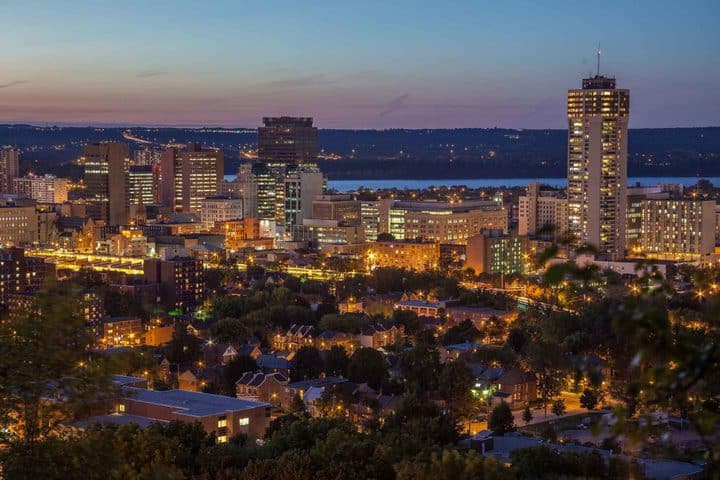
Are you planning to move to Canada? The city you choose to call home is a very important decision. It will play a key role in your career opportunities and financial success going forward. Living in Hamilton, Ontario is one of many cities in Canada new immigrants consider.
Researching a potential landing spot will help you understand the local job market and your housing options. Recently Hamilton has seen a large increase in the number of immigrants coming to the city. So, it is a location worth considering.
Prepare for Canada can guide you with helpful information about living in Hamilton.
About Living in Hamilton, Ontario
Hamilton is a medium-sized city in southwest Ontario, located about 75 kilometres from Toronto. The City of Hamilton includes the former municipalities of Ancaster, Dundas, Flamborough, Glanbrook, and Stoney Creek. The southern part of the city includes the Niagara Escarpment, which Hamiltonians call “the mountain.”
The City of Hamilton is the centre of the Golden Horseshoe — a densely populated region at the west end of Lake Ontario.
Affectionately known as “The Hammer”, it was named after George Hamilton, the man who established the town in 1815. With the opening of the Burlington Canal in 1830, the city became a vital port and railway centre. Over time, the region has evolved to be one of Canada’s top industrial sectors.
Job prospects when living in Hamilton, especially in manufacturing, are promising in the region. If you are looking for a lower-cost place to live, Hamilton is a safe and healthy place to raise your children. It has beautiful parks, trees and waterfalls, and several world-class schools.
How Many People Live in Hamilton, Ontario?
Hamilton has the tenth highest population in Canada with a population of 569,355 according to the 2021 Statistics Canada census. It is the fifth most populated city in Ontario. In many other regions, it is experiencing growth which is largely due to newcomers moving to the region. The city itself had 536,920 people as of the 2016 census. The census metropolitan areas have about 770,000 residents. According to Statistics Canada, 24% of those residents come from other countries.
How to Find a Job & Build a Career in Hamilton

Hamilton’s Local Economy
Hamilton is well known for producing steel for other kinds of heavy manufacturing. This is why it has earned the nickname “Steeltown.” The Hamilton area is the most industrialized section of Canada. It is known as the steel capital of the country for a reason. Hamilton produces 60% of Canada’s steel through two main companies – Stelco and Dofasco.
The job market in Hamilton is evolving. Hamilton’s major industries today include:
- Manufacturing
- Chemical engineering
- Construction
- Bioscience
- Medical
- Agriculture
- Service.
Top Employers in Hamilton
The city offers a diverse range of career paths and employers including:
- ArcelorMittal Dofasco G.P.
- Brock University
- Burlington Hydro Inc.
- Joseph Brant Hospital
- McMaster University
- Mohawk College
- National Tire Distributors, Inc.
- Niagara Health.
Career Pathways in Hamilton
Hamilton is one of the fastest-growing and most diverse economies. This growth is supported by gains in retail, utilities, wholesale, arts, entertainment, and recreation.
The city traditionally has a lower employment rate compared to the provincial and national average. Some of the top industries experiencing job growth currently include:
- construction
- healthcare & social assistance
- education
- finance, insurance, real estate, and
- transportation.
The Hamilton Housing Market
While finding a job is an important first step for newcomers. Another vital step is choosing where you will live. It’s common for new immigrants to opt for short-term rentals or to rent an apartment before buying a home.
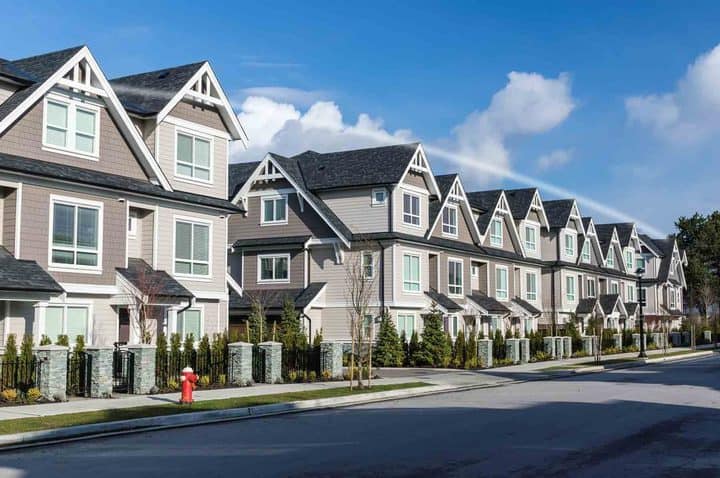
Is Housing Expensive in Hamilton, Ontario?
Hamilton has more than 200 neighbourhoods to choose from, from central Hamilton (the downtown core) to Chinatown to Balfour. Rental and home purchase prices vary depending on the location.
Comparatively speaking, Hamilton is more affordable than large cities close by like Toronto, Mississauga, or Brampton.
Some of the most affordable neighbourhoods to consider include Glanbrook, Hamilton East and West, and Dundas. The most expensive areas to live in include Ancaster, Waterdown, Flamborough, and parts of Hamilton Centre.
Finding a Place to Rent in Hamilton
The cost to rent a home in Hamilton can vary based on your needs. Your location, type of property, unit size, and number of bedrooms will affect how much it will cost to rent monthly. You can find bachelor and 1-bedroom apartments for as low as $950. Renting a 4-bedroom home can easily cost over $2,000 per month.
The average cost to rent an apartment in Hamilton is $1,264 for a Bachelor, $1,403 for a 1 Bedroom, $1,768 for a 2- Bedroom, and $1,998 for a 3- Bedroom.
Use Rentals for Newcomers to search for available rental units in Hamilton. Here you’ll find available rentals with current prices. This is helpful since pricing can change often.
To read more about different neighbourhoods and what makes them unique check out Best Hamilton Neighbourhoods for Renting.
When renting, it’s vital to protect your family, personal belongings, and finances with  . It is common for landlords and property management companies to require proof of insurance as terms of your rental agreement.
. It is common for landlords and property management companies to require proof of insurance as terms of your rental agreement.

Buying a Home in Hamilton
Average home prices are on the rise in Hamilton. This is a common trend across the province. According to Royal LePage the average home price in Hamilton is $772,500 in 2021. This is a year-over-year increase of 19%, and slightly less than the national average cost in Canada ($790,000).
The median price for a single-family detached home is $806,200. The median price to buy a condo is $485,000.
Even with rising prices buying a home in Hamilton is more affordable than living in Toronto. It is one of the many reasons new immigrants choose to move to Hamilton. To purchase a home, contact a realtor in the area, who will guide you through the home-buying process. Find out more about buying your first home in Canada: First Time Home Buyer: Newcomer Tips
Driving & Transportation in Hamilton
Driving in Hamilton, Ontario
The city is situated in a cluster of highways that service southern Ontario. This makes it easy to reach by many different means. The main highways that pass through the city are Highway 403, QEW, Lincoln Alexander Parkway (The Linc), and Red Hill Valley Parkway.
Commuting is the norm in the city. For example, many residents commute from Hamilton to other cities. Many drivers commute to the city for work each day. All drivers must have a valid Ontario driver’s licence to operate a vehicle.
To get a commercial driver’s licence in Ontario you will need a Class A or Class D licence. The class type will depend on your occupation. For example, you will need a Class A licence to drive a truck.
For information on driving in Hamilton and how to get a licence, see Driving in Canada: 10 Essential Facts to Know
Get more information about driving in Canada:
Driving Test in Canada: A Full Guide
Getting Your Ontario Drivers License

Hamilton Public Transportation
The public transportation system within Hamilton relies on the Hamilton Street Railway bus system.
The cost of public transit varies depending on the route and distance. See here for fare prices. GO Transit – an inter-regional public transit system in Southern Ontario – offers frequent and reliable express bus service to Toronto.
Community Support for Newcomers
Hamilton is a diverse city home to newcomers from around the globe. The city supports new immigrants through a variety of services and programs.
New immigrants, refugees, and temporary residents can contact organizations that are part of the Settlement Services for Newcomers. They include the Immigrants Working Centre, Wesley – Resettlement Services for Government Assisted Refugees, YMCA – Immigrant Settlement Services, YWCA – Newcomer Settlement Program, and Centre de Sante Communautaire.
Language Support in Hamilton
Newcomers can improve their English language skills through free Government-funded programs. They include English as a Second Language, or ESL, classes and Language Instruction for Newcomers to Canada, or LINC.
Some of the organizations offering classes are the Immigrants Working Centre, St. Charles Adult Education Centre, The Learning Centre and LINC Program, Mohawk College, College Boreal, and Circle of Friends for Newcomers.
Personal Finance & Banking
All local banks in Hamilton have programs to help newcomers open a bank account and get a credit card. Visit a local bank branch to start the process.
Get more banking tips for newcomers:
Top 10 Financial Steps to Take Before You Leave for Canada
Move to Canada | Transferring Cash & Valuables
Open a Bank Account Before Arriving in Canada
Hamilton’s Education System
Hamilton boasts a robust school system with a university, several colleges, and many elementary and secondary schools.
Elementary and High School Education
Four school boards offer schooling in English and French. In total there are close to 200 schools, including over 30 high schools.
Private Schools
There are 29 private schools in the Hamilton region including 15 elementary schools and 14 secondary schools.
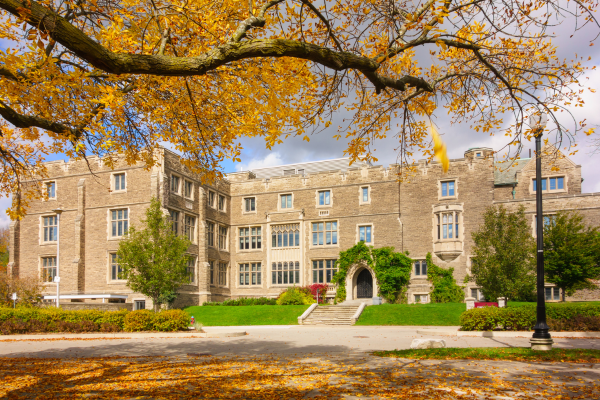
Post Secondary Institutions
Hamilton offers many higher education options that provide academic, practical, and hands-on training.
Schools include McMaster University, Mohawk College, Redeemer University College, McMaster Divinity College, College Boreal, and the Hamilton Literacy Council.
Hamilton’s McMaster University was named Canada’s most innovative ‘medical doctoral’ university eight times in the last 11 years in Maclean’s annual ranking of universities. The university’s student-centred, problem-based, interdisciplinary approach to learning has been adopted by many universities around the world. Established in 1887, the university offers programs in health care, engineering, business, social sciences, science, and humanities research and education.
Hamilton also has many private colleges where residents can learn a new trade or skill to better prepare to enter the workforce. Examples of schools are Trios College, CDI College, National Academy of Health & Business, and Academy of Learning College.
Read more about education in Canada:
Schooling in Canada | A Look at the Education System
Higher Education Offers Benefits to Newcomers

Where To Get Medical Care in Hamilton, Ontario
In case of an emergency call 9-1-1. This number is the same no matter where you live in Canada.
There are six hospitals in Hamilton. Each hospital is a centre of excellence for a particular specialty, providing a state-of-the-art healthcare system to those who live in Hamilton. The hospitals are teaching hospitals. The internationally acclaimed healthcare research conducted at McMaster University ensures that the very best in patient care is available to Hamilton and the region.
Find hospitals in Hamilton here. For prescription drugs and some services not offered through Ontario Health Insurance Plan (OHIP), you can pay for additional  . Some people have third-party health insurance through their employer benefits packages.
. Some people have third-party health insurance through their employer benefits packages.
How to Find a Family Doctor In Hamilton
All newcomers should find a family doctor once they arrive in Hamilton. The Hamilton Family Health Team maintains a list of doctors accepting new patients.
If you can’t find a family doctor, you can use walk-in clinics. Check here to find a walk-in clinic.
Learn more about health care in Canada: Steps to Access Free Health Care in Canada
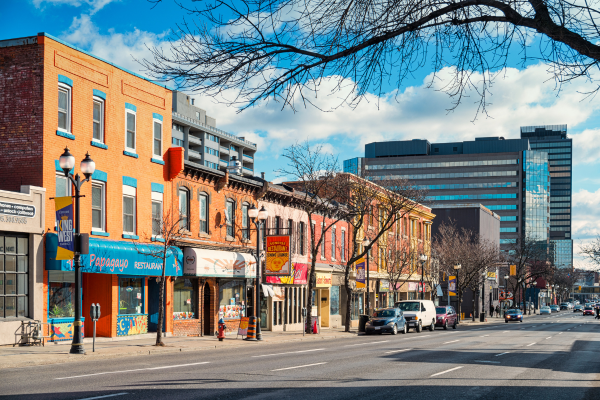
What is Day-to-Day Life Like in Hamilton?
Things To Do in Hamilton
Hamilton has no shortage of things to do. It is a great location to keep the family entertained from local festivals, to great restaurants, and beautiful natural spaces. Hamilton is also a big sports city and its residents are famous for their love of professional and amateur sports.
Public Spaces & Attractions
Hamilton has unique attractions such as Dundurn Castle, Royal Botanical Gardens, and African Lion Safari. As well, Supercrawl is large art and music festival that attracts more than 200,000 visitors each September.
Restaurants & Nightlife
The city is known for its local restaurants. Local eateries downtown and on James Street North, King William, and Locke Street have become the places to go out for dinner. Hess Village is a prime location for dining out and nightlife.
Nature & Natural Landscapes
Hamilton has some of the most unique and beautiful landscapes and nature. It is located on the west end of the Niagara Peninsula. It features the Hamilton Harbour with the Niagara escarpment running through the city. The area is home to over 100 waterfalls and the Bruce Trail for hiking.
Sporting Events & Concerts
Hamilton is home to the Hamilton Tiger-Cats of the Canadian Football League (CFL). In 2021, they are the host to the Grey Cup in which the hometown Tiger-Cats will play the Winnipeg Blue Bombers. The city is also home to the Hamilton Bulldogs of the Ontario Hockey League (OHL).
With many hockey arenas, pools, soccer fields, baseball diamonds, and even cricket pitches throughout the city, it’s proof that the city promotes sports. Hamilton offers other pastimes as well, including golfing, fencing, mountain biking, swimming, mountaineering, curling and martial arts. The city is also home to the Canadian Football Hall of Fame.
With large venues such as FirstOntario Centre, Tim Hortons Field, and many local venues throughout the city, Hamilton attracts top interactional concerts.

Culture & Diversity In Hamilton
Diversity
Hamilton is a diverse city. About one in four residents in Hamilton were born outside of Canada. About 3,000 to 4,000 new immigrants arrive in the city each year. The city is also home to over 5,000 international students. The most prominent minority groups are South Asian, Black, Arab, Chinese, Black, and Latin American.
Places of Worship
Hamilton is a diverse city and home to many different places of worship. The main religions followed in the city include Christianity, Islam, Judaism, Buddhism, Hinduism, and Sikhism. See here for places of worship in Hamilton.
The Weather in Hamilton
Hamilton’s climate is humid continental. The city experiences just about every type of weather throughout the year – humidity, hot sunny days, rain, snow, sleet, and a mixture. The climate is moderate compared to the rest of Canada. The temperature averages about 22 degrees Celsius in July and August, and dips to as low as -4 degrees in January and February.
Common Questions Immigrants Ask About Living in Hamilton
Is Hamilton A Good Place to Live?
Yes, Hamilton is considered by most to be a good place to live in Ontario. It has a diverse population, a growing culinary culture, access to affordable housing, and world-class health care. The economy is growing, providing career paths for new immigrants who want to live in Hamilton.
Is Hamilton a Cheap Place to Live?
Hamilton can be more expensive than other cities in Canada. However, it is more affordable than Toronto and other larger cities within proximity in Ontario.
Is Hamilton Good for Immigrants?
Absolutely. Thousands of new immigrants move to Hamilton each year. The city embraces its diverse population and provides many support programs to help newcomers adapt to the city.
